New Hampshire Documents
Quitclaim Deed
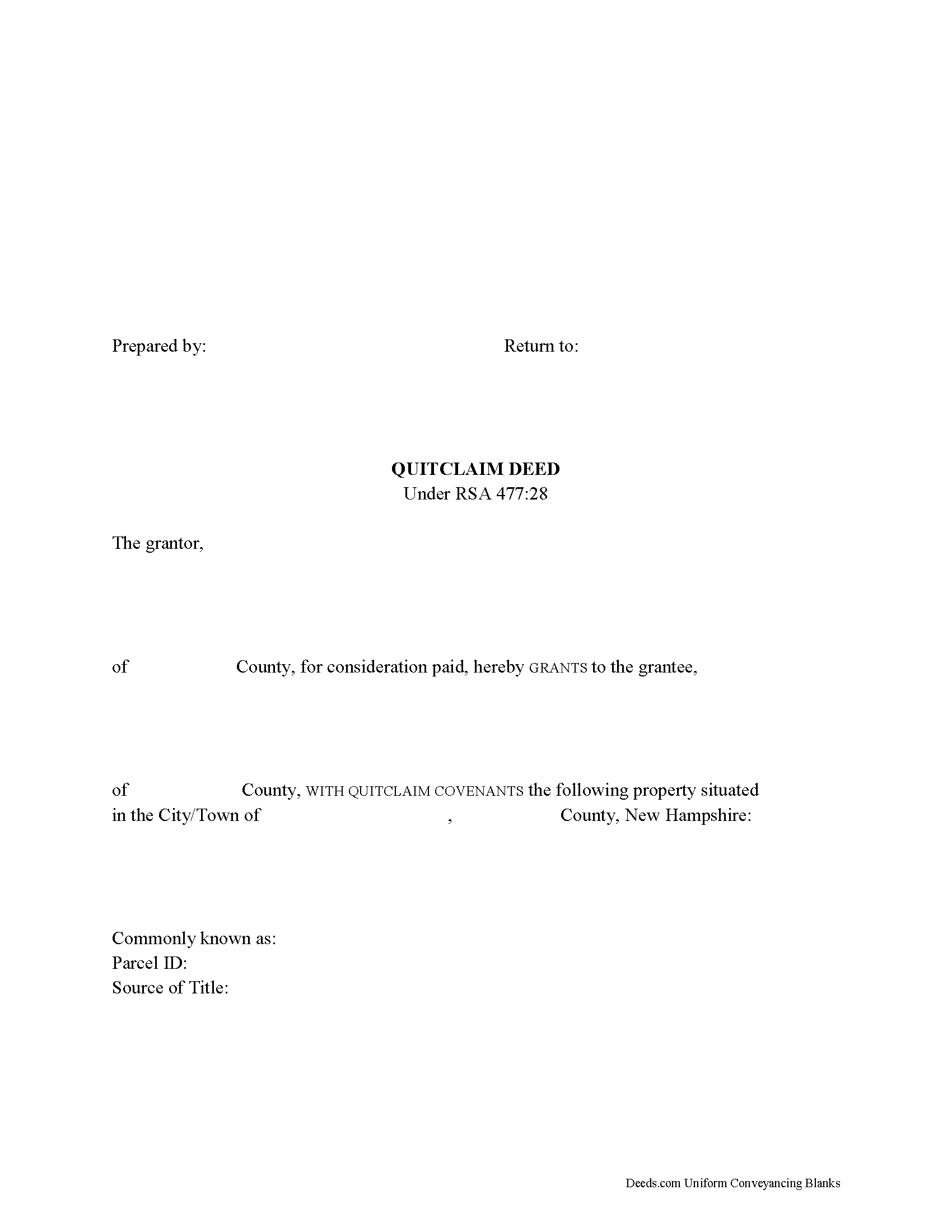
In New Hampshire, real property can be transferred from one party to another by executing a quitclaim deed.
Quitclaim deeds are statutory in New Hampshire under RSA 477:28. Any deed that follows this form has the force and effect of transferring fee simple title with covenants. The grantor promises that, at the time of conveyance, the property is free from all encumbrances made by the grantor, except for restrictions stated within the deed. The grantor also promises to warrant and defend the property against any lawful claims and demands made by, through, or under him or her, but none other (RSA 477:28). This means that the grantor guarantees the title only against claims that arose during the time he or she held title to the property.
A lawful quitclaim deed includes the grantor's full name, mailing address, and marital status, and the grantee's full name, mailing address, marital status, and vesting. Vesting describes how the grantee holds title to the property. Generally, real property is owned in either sole ownership or in co-ownership.
For New Hampshire residential property, the primary methods for holding title in co-ownership are tenancy in common and joint tenanc... More Information about the New Hampshire Quitclaim Deed
Manufactured Housing Quitclaim Deed
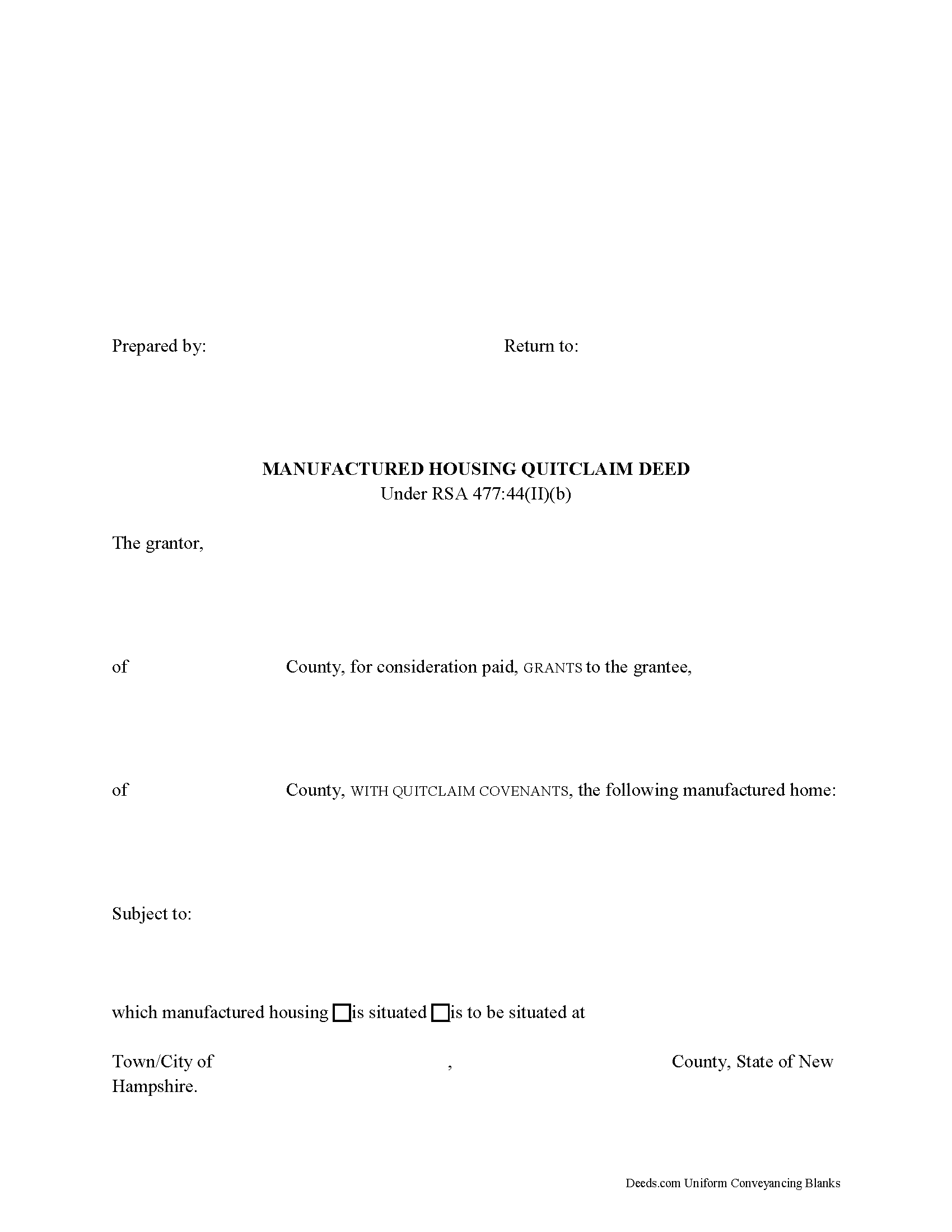
Manufactured housing is a structure that is "transportable and... one or more sections" and designed to be a dwelling with no permanent foundation (RSA 674:31). This type of housing is considered real property and must be transferred by deed. In New Hampshire, manufactured housing can be transferred from one party to another by executing a manufactured housing quitclaim deed.
Manufactured housing quitclaim deeds are statutory in New Hampshire under RSA 477:44(II)(b). Any deed that follows this form has the force and effect of transferring fee simple title with covenants, or guarantees made by the seller (grantor). The grantor promises that, at the time of conveyance, the manufactured housing is free from all encumbrances made by the grantor, except as stated within the deed. The grantor also promises to warrant and defend the property against any lawful claims and demands made by, through, or under him or her, but none other (RSA 477:44(II)(b)). This means that the grantor guarantees the title only against claims that arose during the time he or she held title to the property.
A lawful manufactured housing quitclaim deed includes the grantor's full name, mailing address, and... More Information about the New Hampshire Manufactured Housing Quitclaim Deed
Manufactured Housing Warranty Deed
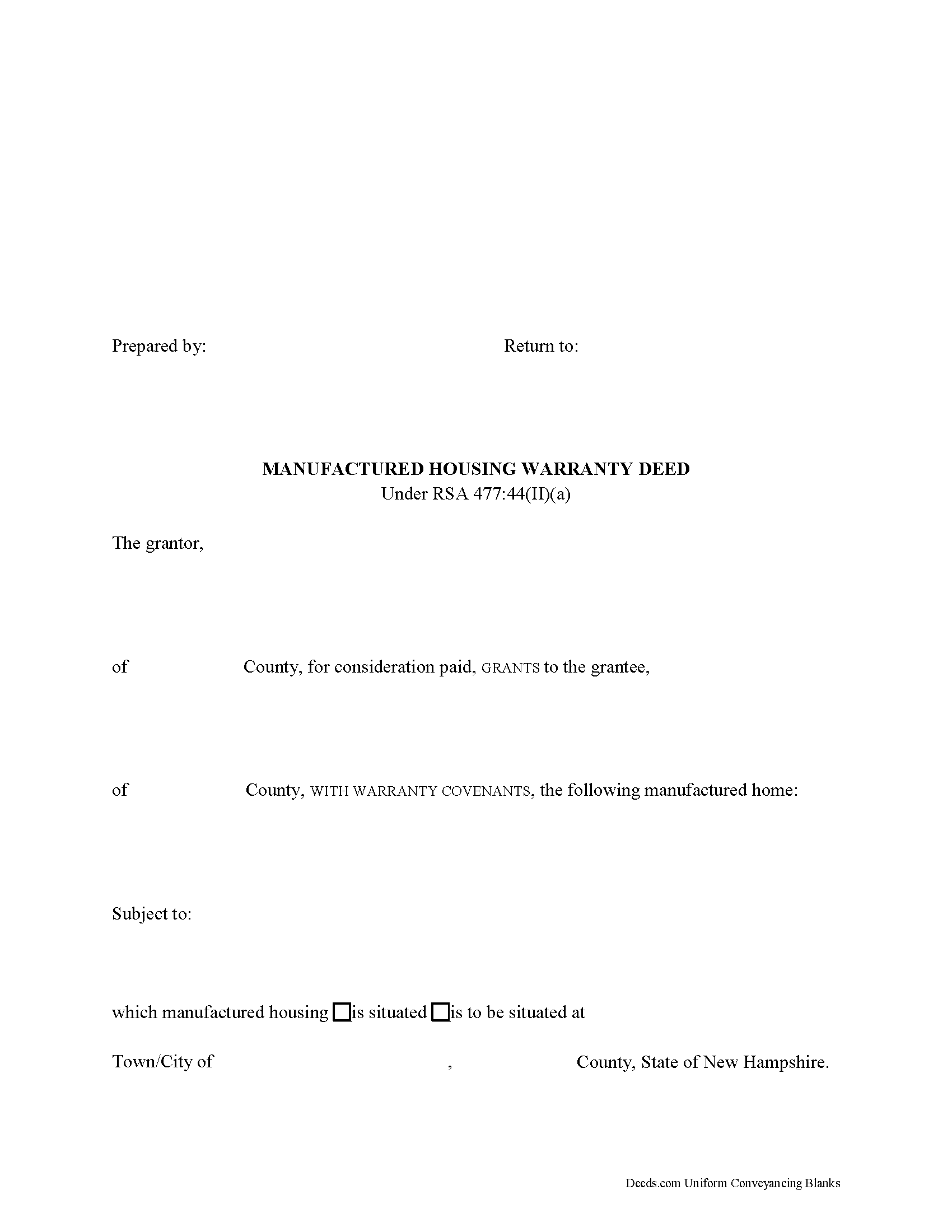
Manufactured housing is a structure that is "transportable in one or more sections" and designed to be a dwelling with no permanent foundation (RSA 674:31). This type of housing is considered real property and must be transferred by deed. In New Hampshire, manufactured housing can be transferred from one party to another by executing a manufactured housing warranty deed.
Manufactured housing warranty deeds are statutory in New Hampshire under RSA 477:44(II)(a). Any deed that follows this form transfers fee simple title with covenants. The grantor promises that, at the time of conveyance, he or she "was lawfully seized in fee simple of the manufactured housing" and has good right to sell and convey said premises; that the property is free from all encumbrances, except for restrictions stated within the deed; and that he or she will warrant and defend the property against any lawful claims and demands made by all persons (RSA 477:44(II)(a)).
Unlike a manufactured housing quitclaim deed under RSA 477:44(II)(b), a manufactured housing warranty deed guarantees the property against any and all claims. Instead, a manufactured housing quitclaim deed only guarantees the title against... More Information about the New Hampshire Manufactured Housing Warranty Deed
Gift Deed
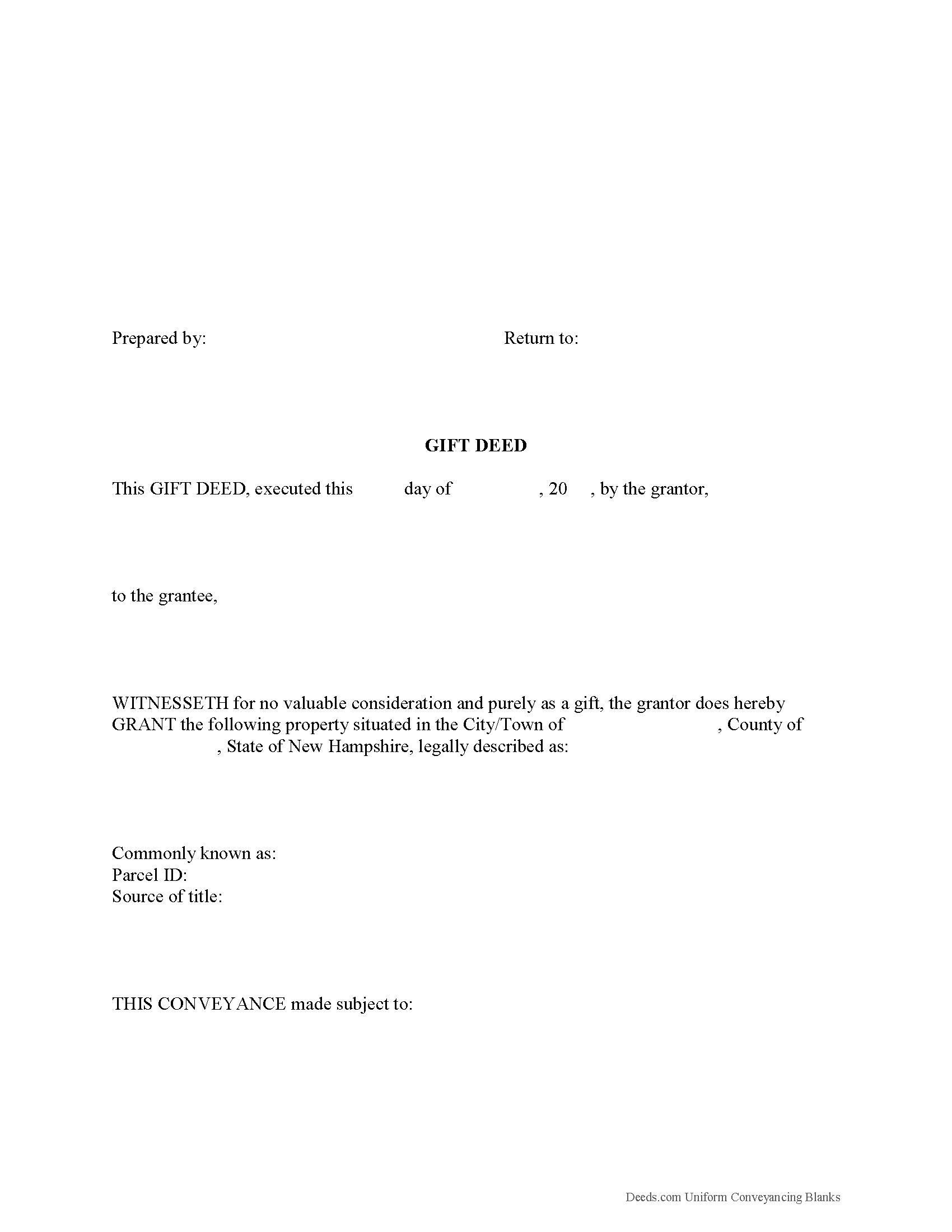
A gift deed, or deed of gift, is a legal document voluntarily transferring title to real property from one party (the grantor or donor) to another (the grantee or donee). A gift deed typically transfers real property between family or close friends. Gift deeds are also used to donate to a non-profit organization or charity. The deed serves as proof that the transfer is indeed a gift and without consideration (any conditions or form of compensation).
Valid deeds must meet the following requirements: The grantor must intend to make a present gift of the property, the grantor must deliver the property to the grantee, and the grantee must accept the gift. Gift deeds must contain language that explicitly states no consideration is expected or required, because any ambiguity or reference to consideration can make the deed contestable in court. A promise to transfer ownership in the future is not a gift, and any deed that does not immediately transfer the interest in the property, or meet any of the aforementioned requirements, can be revoked [1].
A lawful gift deed must also include the grantor's full name and marital status, as well as the grantee's full name, marital status, m... More Information about the New Hampshire Gift Deed
Warranty Deed
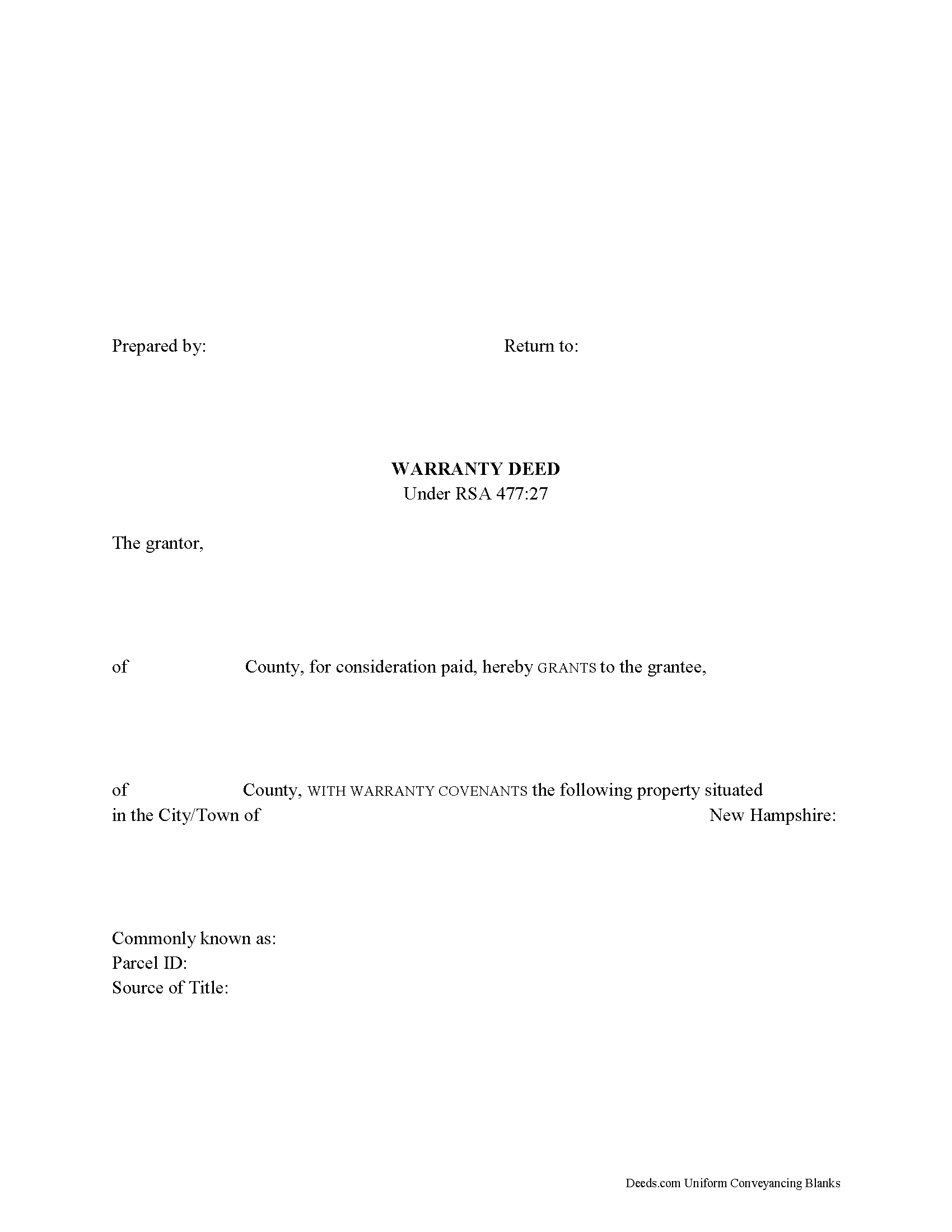
In New Hampshire, real property can be transferred from one party to another by executing a warranty deed.
Warranty deeds are statutory in New Hampshire under RSA 477:27 and transfer fee simple title with covenants, or guarantees from the seller (grantor). The grantor promises that, at the time of conveyance, he or she "was lawfully seized in fee simple of the granted premises" and has good right to sell and convey said premises; that the property is free from all encumbrances, except for restrictions stated within the deed; and that he or she will warrant and defend the property against any lawful claims and demands made by all persons (RSA 477:27).
Unlike a quitclaim deed under RSA 477:28, a warranty deed guarantees the property against any and all claims. Quitclaim deeds only guarantee the title against claims that arose during the time the grantor held title to the property.
A lawful warranty deed includes the grantor's full name, mailing address, and marital status, and the grantee's full name, mailing address, marital status, and vesting. Vesting describes how the grantee holds title to the property. Generally, real property is owned in either sole ownership or in ... More Information about the New Hampshire Warranty Deed
Special Warranty Deed
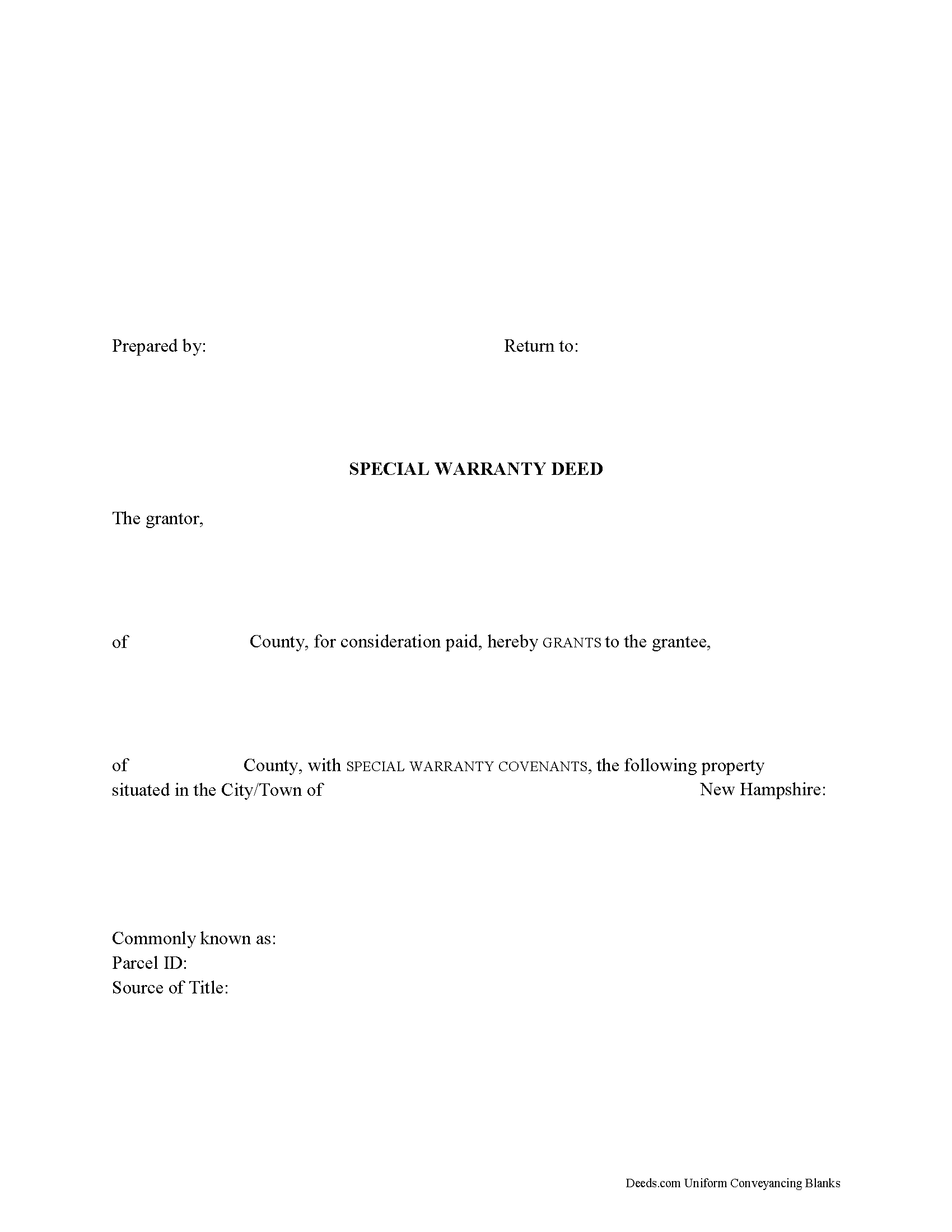
In New Hampshire, real property can be transferred from one party to another by executing a special warranty deed.
Special warranty deeds transfer fee simple title with limited covenants. The grantor promises that he or she holds title to the property in fee simple; that the property is free from encumbrances, except those noted in the deed; and that the grantor and his heirs and assigns will warrant and defend the property against the lawful claims and demands of all persons claiming by, through, or under the grantor, but none other.
Unlike a warranty deed under RSA 477:27, a special warranty deed only guarantees the title against claims that arose during the time the grantor held title to the property. A quitclaim deed under RSA 477:28 makes the same guarantee, but it does not guarantee that the grantor is seized of the property in fee simple. Special warranty deeds are valid, but not statutory in New Hampshire.
A lawful special warranty deed includes the grantor's full name, mailing address, and marital status, and the grantee's full name, mailing address, marital status, and vesting. Vesting describes how the grantee holds title to the property. Generally, real proper... More Information about the New Hampshire Special Warranty Deed
Grant Deed
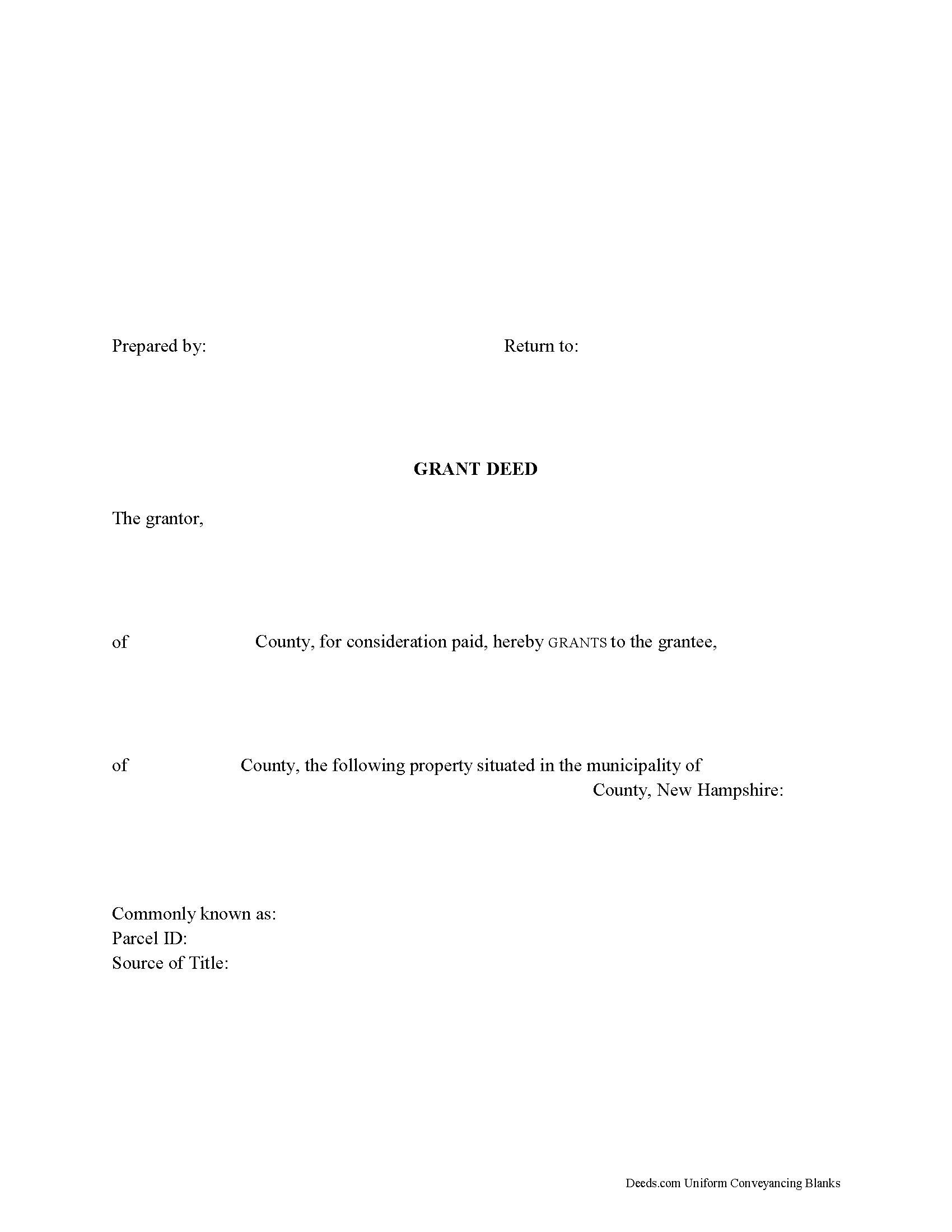
In New Hampshire, real property can be transferred from one party to another by executing a grant deed. A standard grant deed conveys an interest in real property to the named grantee with covenants that the title is free of any encumbrances (except for those disclosed in the deed) and that the grantor holds an interest in the property and is free to convey it. Grant deeds are valid, but not statutory in New Hampshire, and the form of the instrument of transfer must specifically state these covenants.
A lawful grant deed includes the grantor's full name, mailing address, and marital status, and the grantee's full name, mailing address, marital status, and vesting. Vesting describes how the grantee holds title to the property. Generally, real property is owned in either sole ownership or in co-ownership.
For New Hampshire residential property, the primary methods for holding title in co-ownership are tenancy in common and joint tenancy. A grant of ownership of real estate to two or more persons is presumed to create a tenancy in common, unless a joint tenancy is expressly stated (RSA 477:18).
As with any conveyance of realty, a grant deed requires a complete legal descripti... More Information about the New Hampshire Grant Deed
Easement Deed
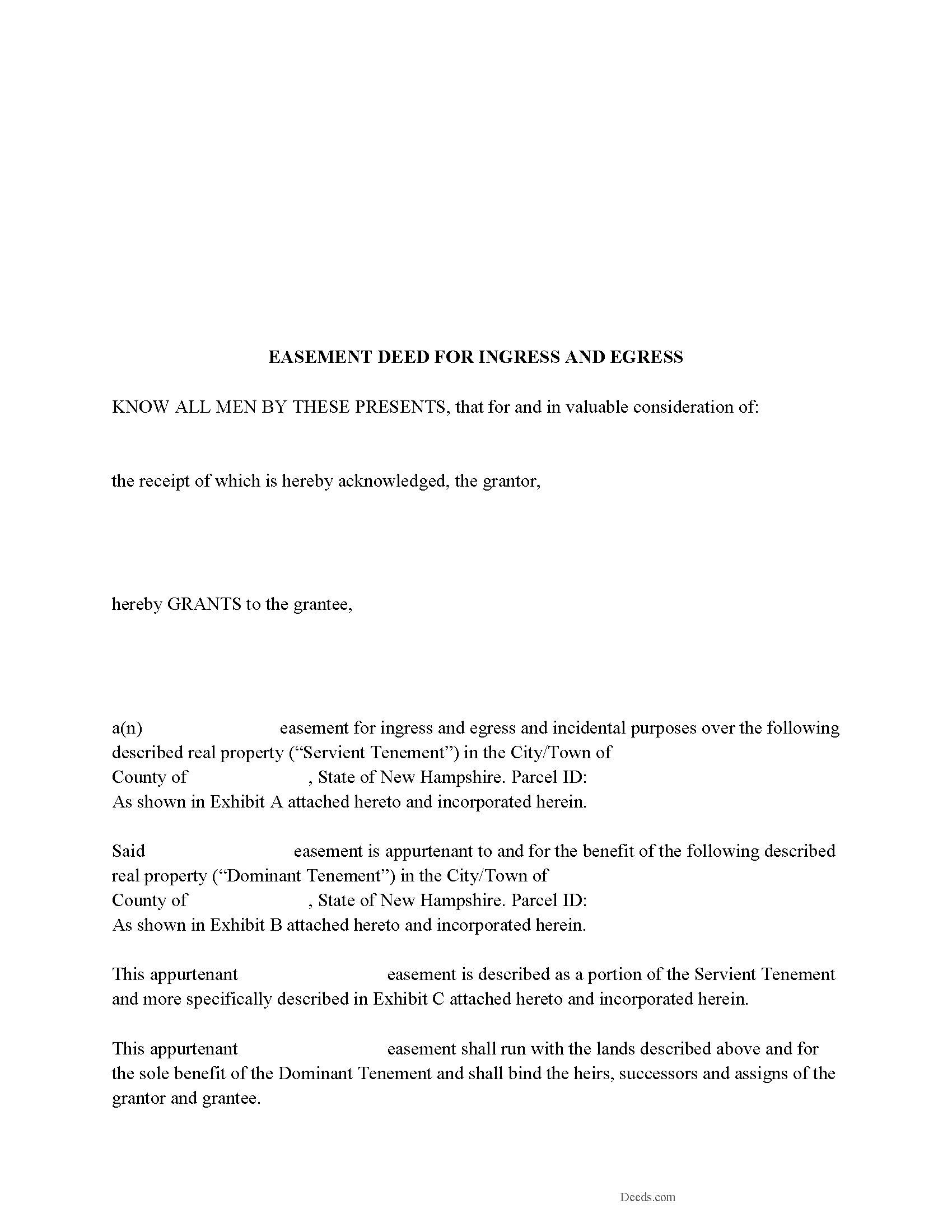
An easement is the right to use another person's property for a specific purpose. This is a non-possessory and non-ownership interest, and the rights contained in the interest are created by an easement deed. The easement deed should specify the terms, conditions, and duration of the agreement. An easement can be made to benefit the land or to benefit an individual or legal entity. In a conveyance of real estate in New Hampshire, all easements, appurtenances, privileges, and rights belonging to the granted estate are deemed to be included in the conveyance, unless a different intention appears in the deed (477-26).
A solar skyspace easement in New Hampshire can be acquired and transferred and is recorded in the same manner as any other conveyance of an interest in real property. This easement will run with the benefitted and burdened land and will terminate upon the conditions stated in the deed (477-50). The statutory form for a solar skyspace easement is offered in 477:51 of the New Hampshire Revised Statutes.
An easement deed is an interest in real estate and should therefore be signed and acknowledged by the grantor before a justice, notary public, or commissioner before i... More Information about the New Hampshire Easement Deed
Termination of Easement
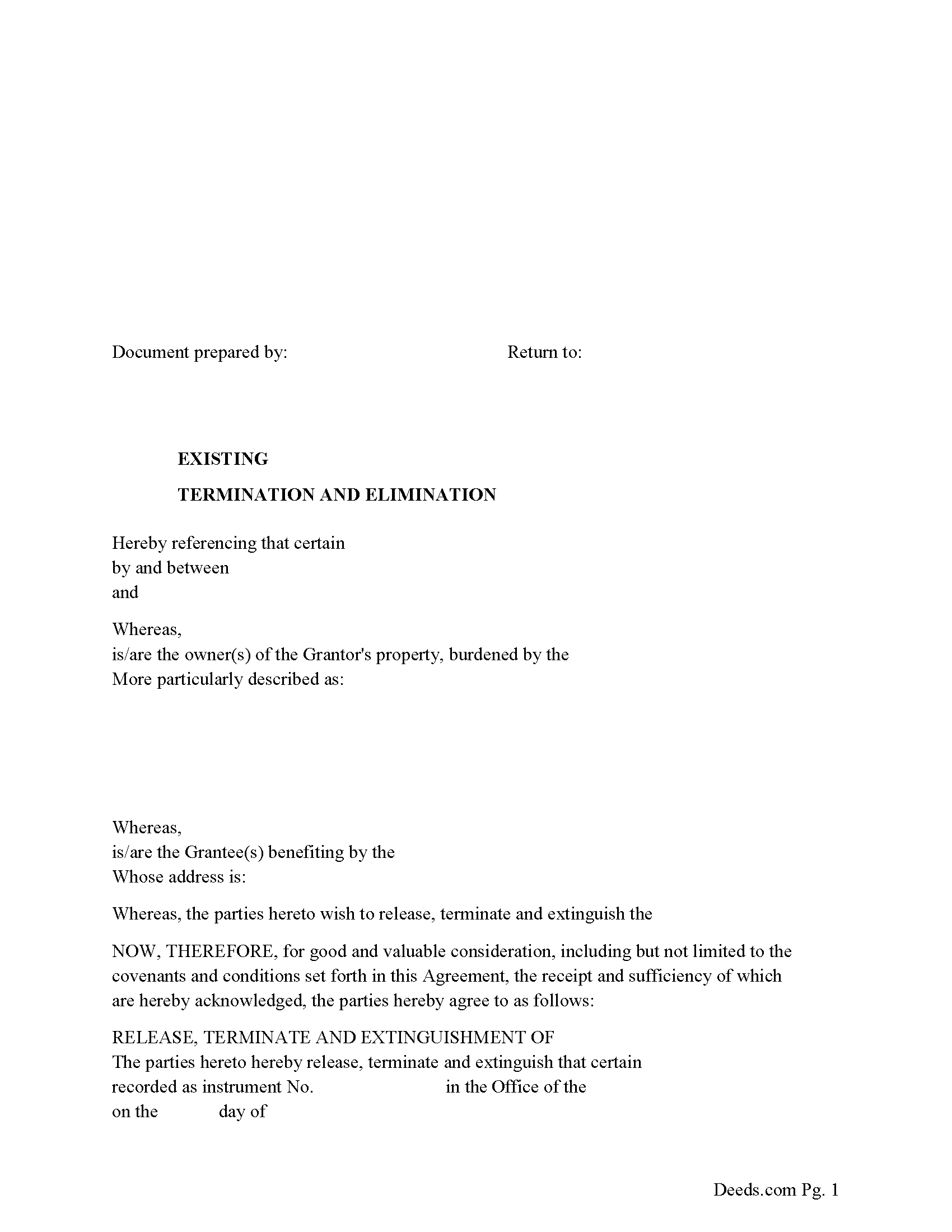
Use this form to release, terminate, extinguish a previously recorded document that involves access to and from a property.
Documents such as:
1. Easement Deeds or Agreements (An easement is a non-possessory interest in land, granting the right to use someone else's property for a specific purpose, like a driveway or utility line)
2. Access Roads
3. Right of Ways
4. Utility Easements (Power, Gas, Water, Sewer, Etc.)
5. Drainage Easements
This document allows the owner of the land, burdened by the access and the party that benefits from the access, to sign an agreement releasing the property from such access, ... More Information about the New Hampshire Termination of Easement
Correction Deed
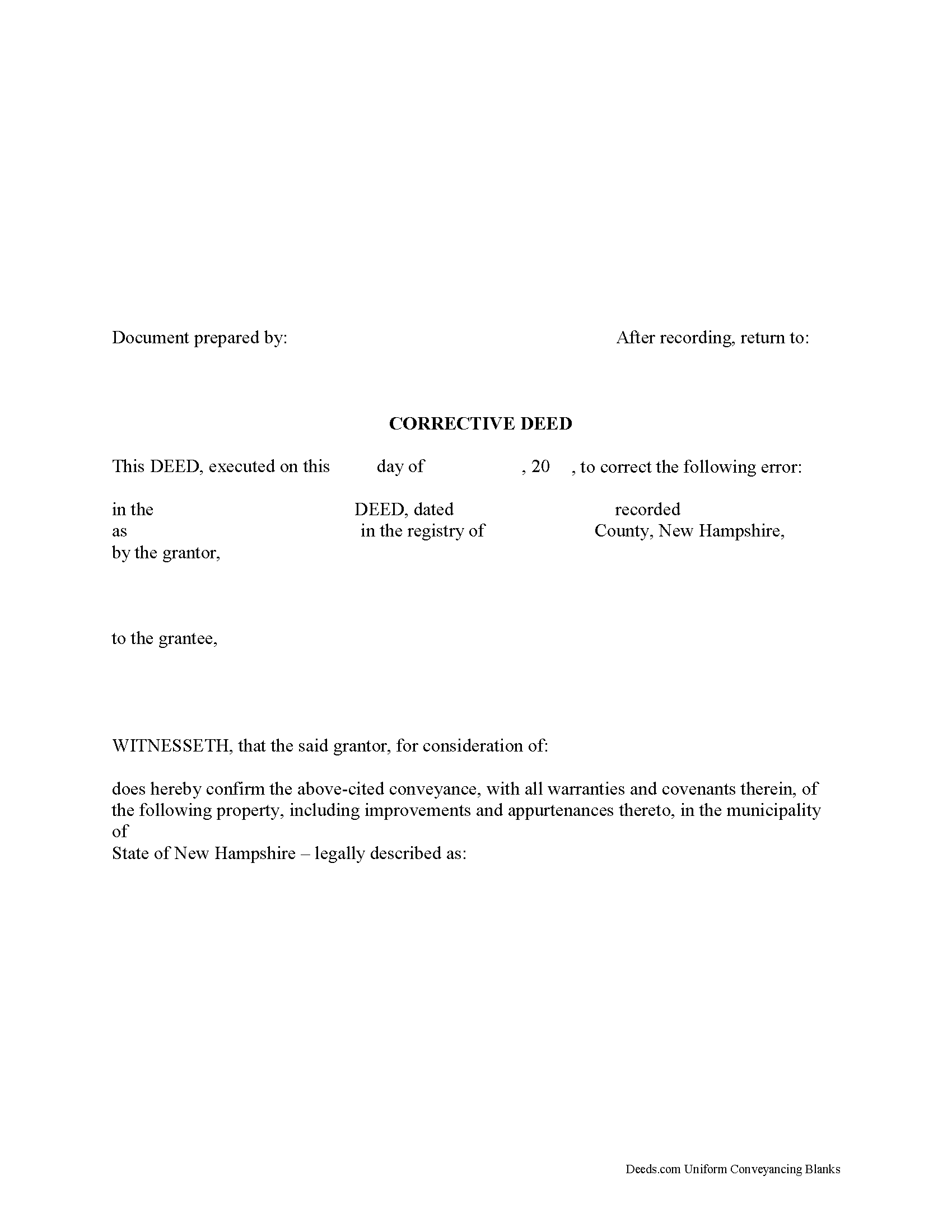
Use the corrective deed to correct an error in a previously recorded deed of conveyance in New Hampshire.
Correcting an error in a recorded deed helps prevent problems that might arise when the current owner tries to sell the property. The best method for correction is to prepare and record a new document, a so-called corrective deed. This document does not convey title; instead, it confirms the prior conveyance of the property.
Apart from supplying the correct information, the new deed must state the reason for correcting and reference the prior deed by title, date, and recording number. It must be signed by the original grantor, confirming the earlier conveyance to the original grantee. Generally, corrective deeds are used to address minor errors in a deed, such as typos, accidentally omitted suffixes or middle initials in names, and other minor omissions. A defect in the acknowledgment might also be corrected with such a deed. When in doubt about the gravity of an error, consult with a lawyer.
For certain types of changes, a correction deed may not be appropriate. Adding or removing a grantee, for example, or changing the manner in which title is held, or making materi... More Information about the New Hampshire Correction Deed
Fiduciary Deed
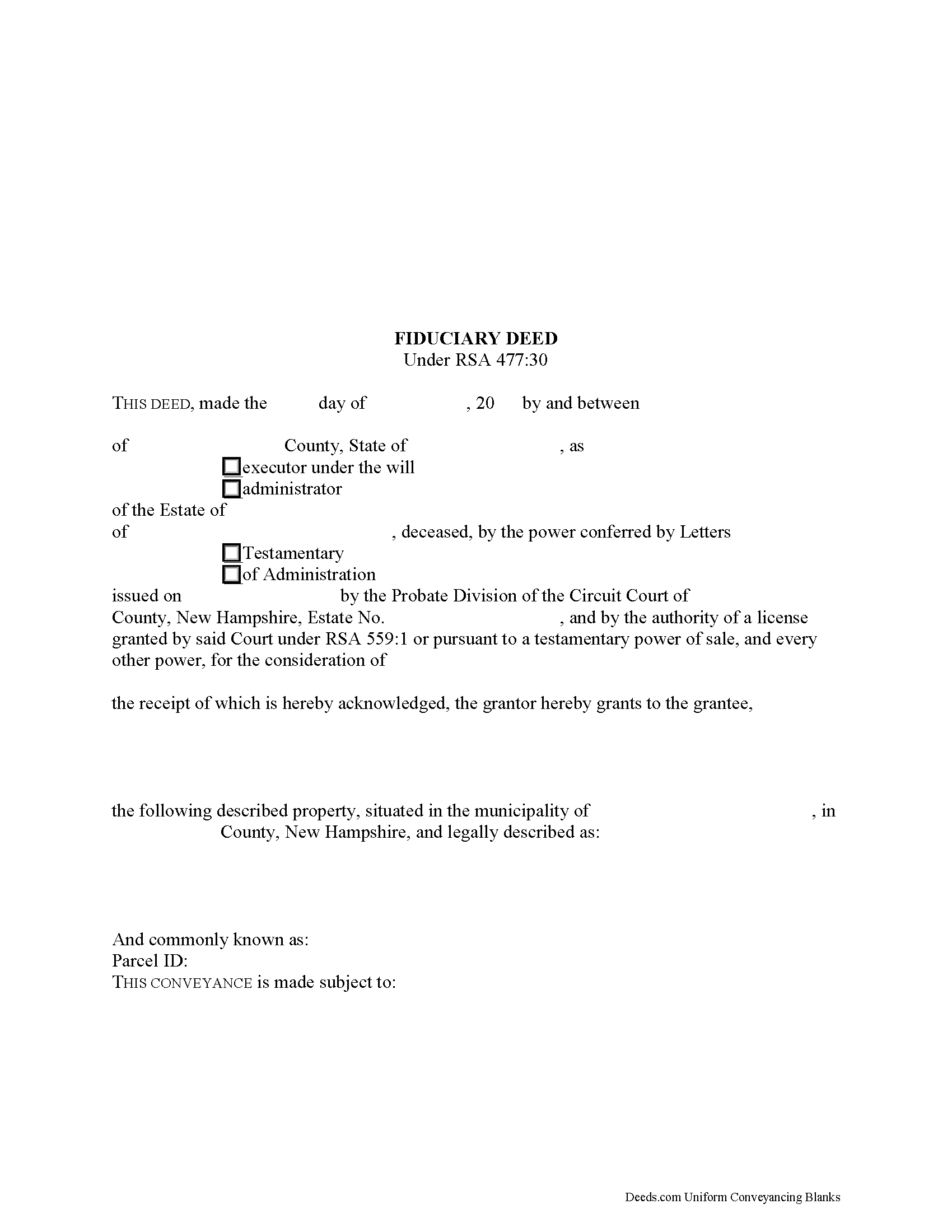
The fiduciary deed is a statutory form under RSA 477:30. In the context of estate administration, a fiduciary is either an executor of a will or a court-selected administrator appointed when the decedent dies without a will or an executor cannot serve.
Execute a fiduciary deed to convey realty from an estate to a purchaser following a sale of real estate. The executing fiduciary must have a license to sell real property granted by the court, or granted a power of sale by the decedent's will.
Alternately, use a fiduciary deed to distribute property to a person entitled by will or by law to receive it from the decedent's estate, pursuant to a decree for distribution by the court.
Fiduciary deeds convey realty in fee simple to their named grantee with the following covenants: that the grantor was duly authorized to make the sale of the premises; that the grantor has complied with statutory requirements of sale; and that the grantor will warrant and defend the title against the lawful claims of persons by, from, or under him or her in his or her representative capacity.
The deed identifies the capacity of the grantor (in this case, either executor or administrator) and n... More Information about the New Hampshire Fiduciary Deed
Mortgage Deed and Security Agreement
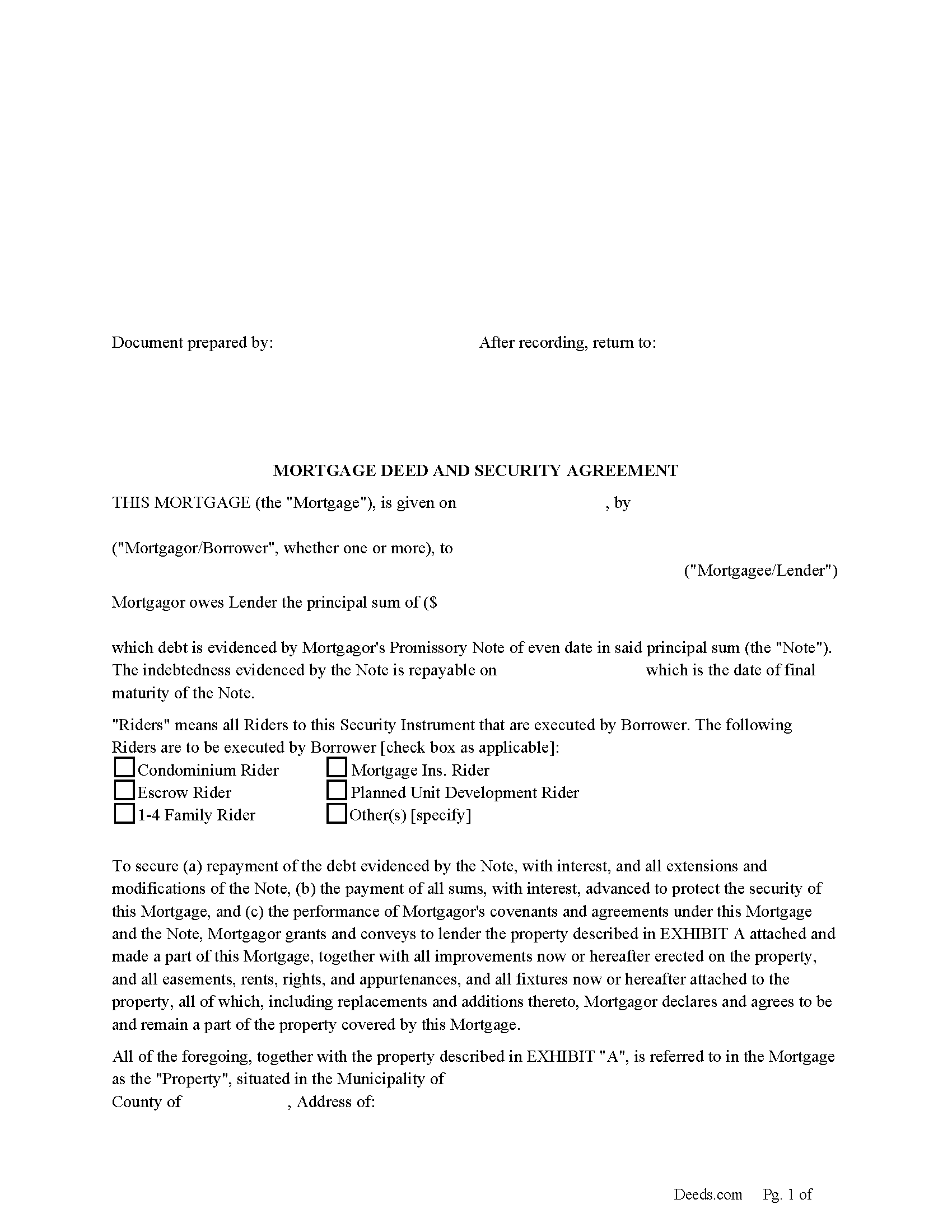
Mortgage Deed and Security Instrument with Statutory Power of Sale
Use this form for financing real property, vacant land, rental units and small commercial property. (No conveyance in writing of lands shall be defeated nor any estate encumbered by an agreement unless it is inserted in the condition of the conveyance and made part thereof, stating the sum of money to be secured, or other thing to be performed.) (NH Rev Stat 479:2)
In order to record a mortgage it must contain (in the first sentence of the first description paragraph, the names of all municipalities in which the property is located)(NH Rev Stat 478:4-a(b))
(The words ""statutory power of sale'' shall be understood as giving the mortgagee and executors, administrators, successors and assigns the right, upon any default of the performance of the statutory condition as defined in paragraph II, or any other condition contained in the mortgage, to foreclose by sale under the provisions of RSA 479:25-27-a inclusive.) (NH Rev Stat Section 477:29 III) This can be very beneficial to the lender upon a default.
The Promissory Note also contains stringent terms and conditions such as late fees, default rates, ob... More Information about the New Hampshire Mortgage Deed and Security Agreement
Discharge of Mortgage
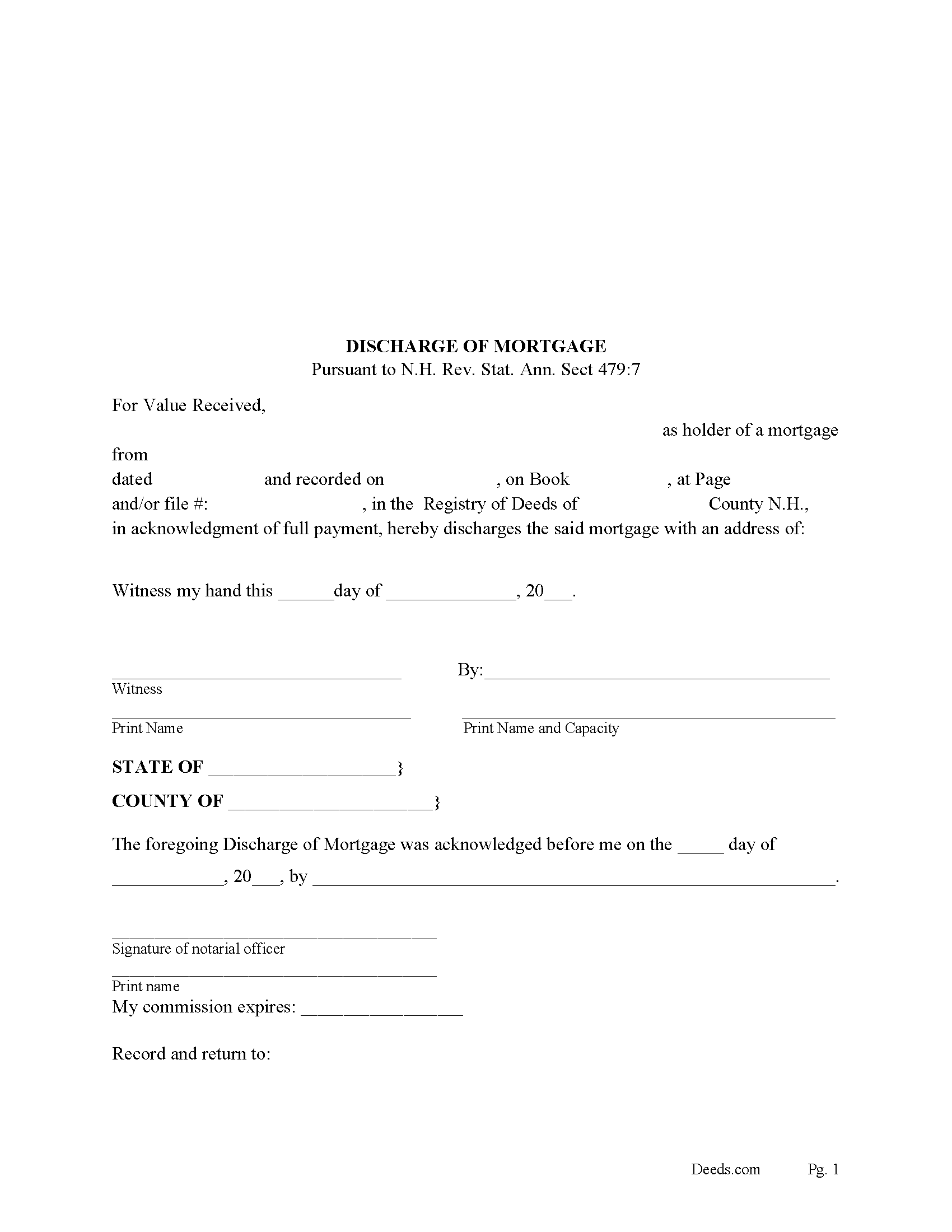
The Mortgagee/Lender generally has 60 days to satisfy/discharge a mortgage (after said mortgage is satisfied and having reasonable charges tendered to the mortgagee). [Said discharge shall be in the form of a written document and shall be signed by the mortgagee, his executor, administrator, successor, or assign whose signature shall be witnessed or acknowledged]. (N.H. Rev. Stat. 479:7 (II)), [N.H. Rev. Stat. 479:7 (I)]
After 60 days a Discharge by Affidavit is used.
(I. Notwithstanding the provisions of RSA 479:10, if such mortgagee fails to make such discharge of the mortgage within 60 days from receipt of payment of the mortgage in accordance with the payoff statement furnished to the mortgagor by the mortgagee, an attorney-at-law licensed to practice in the state of New Hampshire may, on behalf of the mortgagor; the mortgagor's executor, administrator, assignee, transferee, or other successor in title; or the mortgagee of the mortgagor's transferee or other successor in title; execute and cause to be recorded in the registry of deeds in which the mortgage is recorded, an affidavit which states that:) (479:7-a Discharge by Affidavit.)
(New Hampshire Discharge of Mo... More Information about the New Hampshire Discharge of Mortgage
Assignment of Mortgage
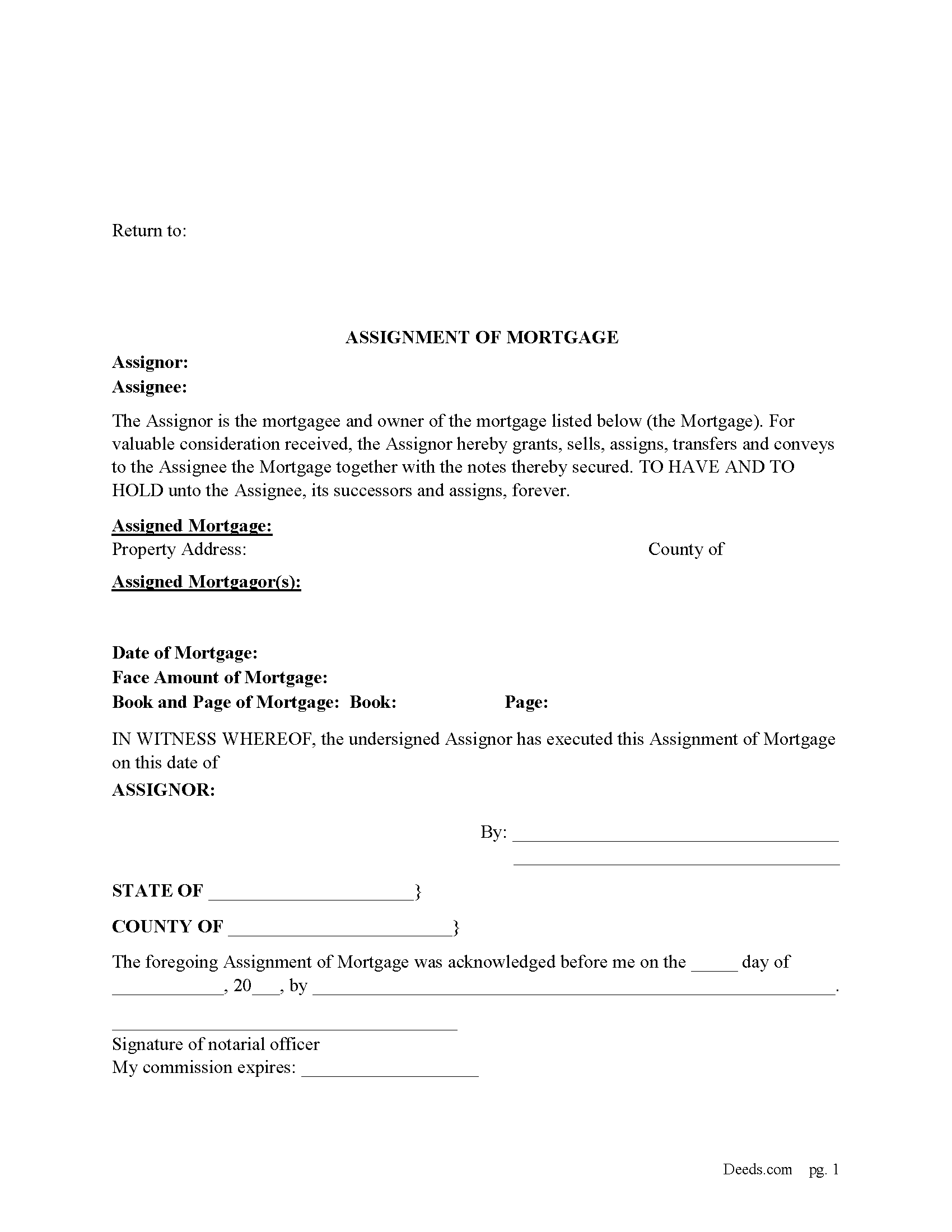
In this form the Mortgagee/Lender assigns an existing mortgage to another party, this is often performed when loans are sold. Document is signed by current mortgagee, his/her executor, representative, administrator or successor. Record in the County where the land is located, to protect lien rights.
(New Hampshire AOM Package includes form, guidelines, and completed example) For use in New Hampshire only.
... More Information about the New Hampshire Assignment of Mortgage
Waiver by Surviving Spouse
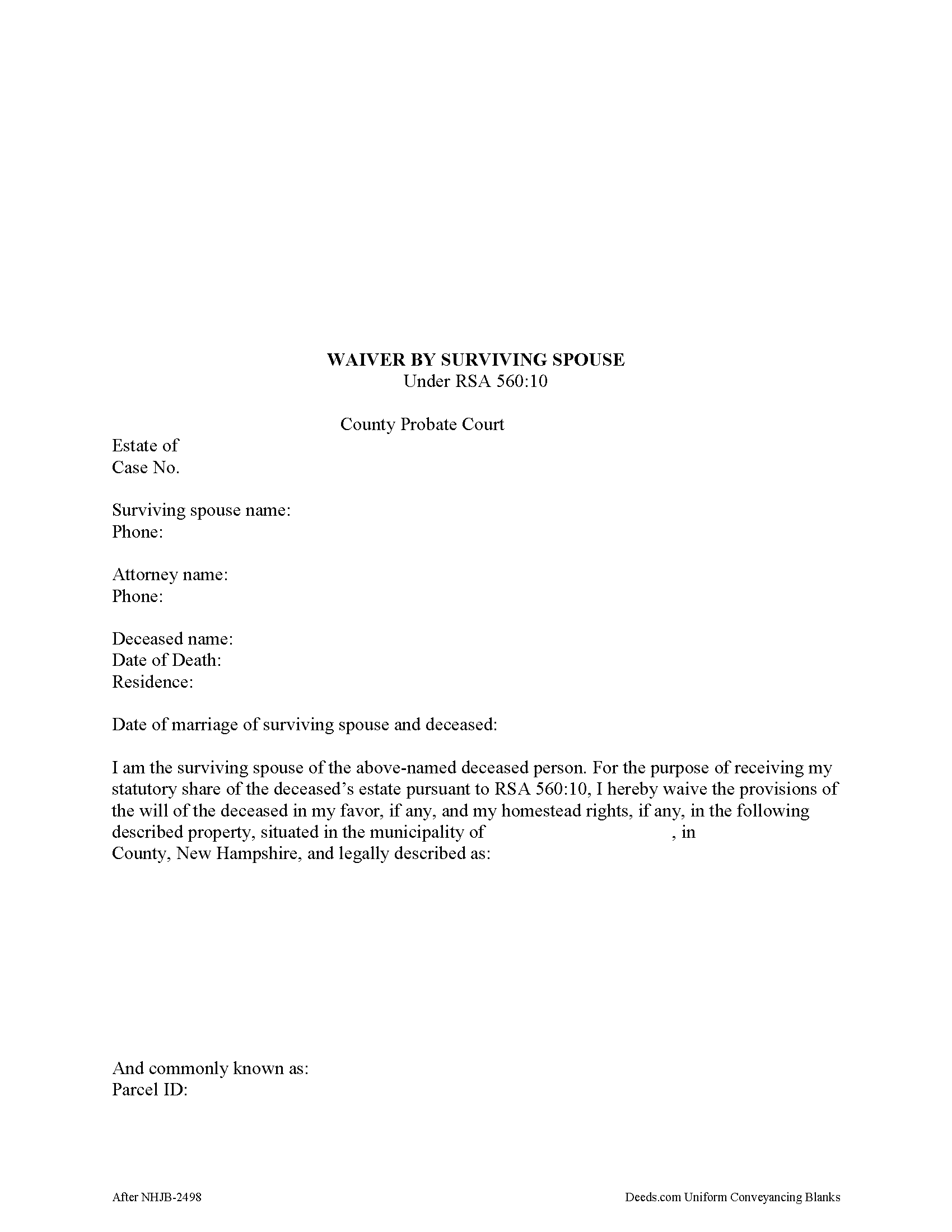
Use this document to waive a surviving spouse's testate distribution and homestead rights, if any, in order to take a statutory share of the deceased spouse's estate. Widows or widowers may opt to execute a waiver of surviving spouse when the statutory share for a surviving spouse under RSA 560:10 is greater than the testate distribution.
Pursuant to RSA 560:14, file the waiver with the probate court within six months of the administrator's appointment, and, when real property is involved, record in the registry of deeds of the county where the property to which it pertains is located.
The document must state the surviving spouse's name, the decedent's name and date of death, and the date of marriage of the surviving spouse and decedent. Because the document relates to real property, it also requires a legal description of the relevant realty. The surviving spouse waiving testamentary distribution and homestead rights must sign in the presence of a notary public.
Consult an attorney licensed in the State of New Hampshire with questions regarding rights of surviving spouses.
(New Hampshire WBSS Package includes form, guidelines, and completed example)... More Information about the New Hampshire Waiver by Surviving Spouse
Notice of Intention to File a Mechanics Lien
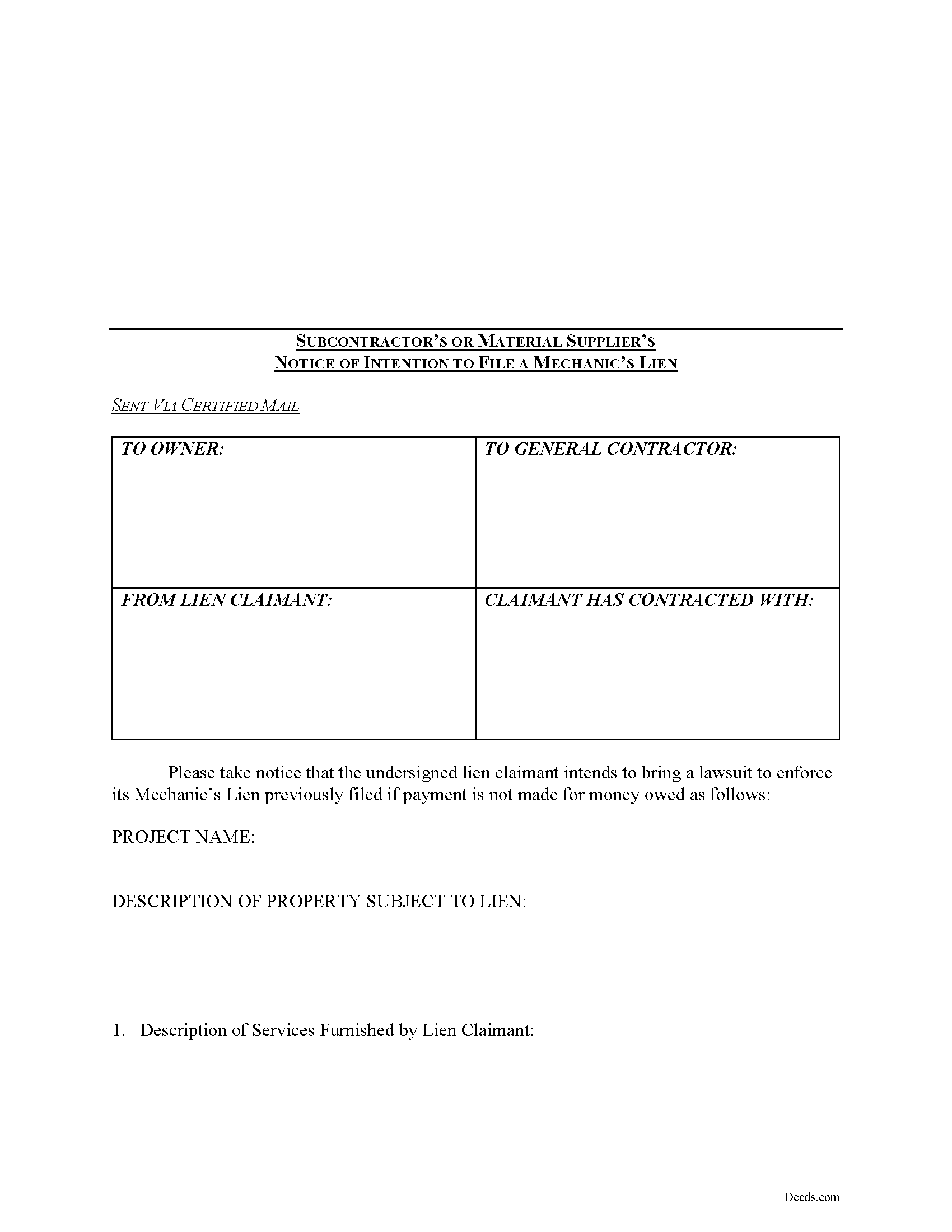
Mechanic's liens are governed under Chapter 447 of the New Hampshire Statutes.
The Notice of Intention to File a Mechanic's Lien shows a property owner or other party that the contractor is prepared to file for a lien if payment is not made on an outstanding balance for work completed.
The Notice should be directed to the property owner, lessor, guarantor, or other party responsible for any lien placed on the property. The document contains the name and contact information of the lien claimant, information about the subject property including a legal description, an itemized list of all materials delivered or labor furnished to date, and a breakdown of costs due. As an additional persuasive measure, include a draft copy of the petition for ex parte attachment to show the recipient the contractor is fully prepared to file the petition in court.
This article is offered for informational purposes only and is not legal advice. This information should not be relied upon as a substitute for speaking with an attorney. Please speak with an attorney familiar with lien laws for questions regarding the notice of intention to file a lien, or with any other issues related to mechanic's... More Information about the New Hampshire Notice of Intention to File a Mechanics Lien
Petition for Ex Parte Attachment
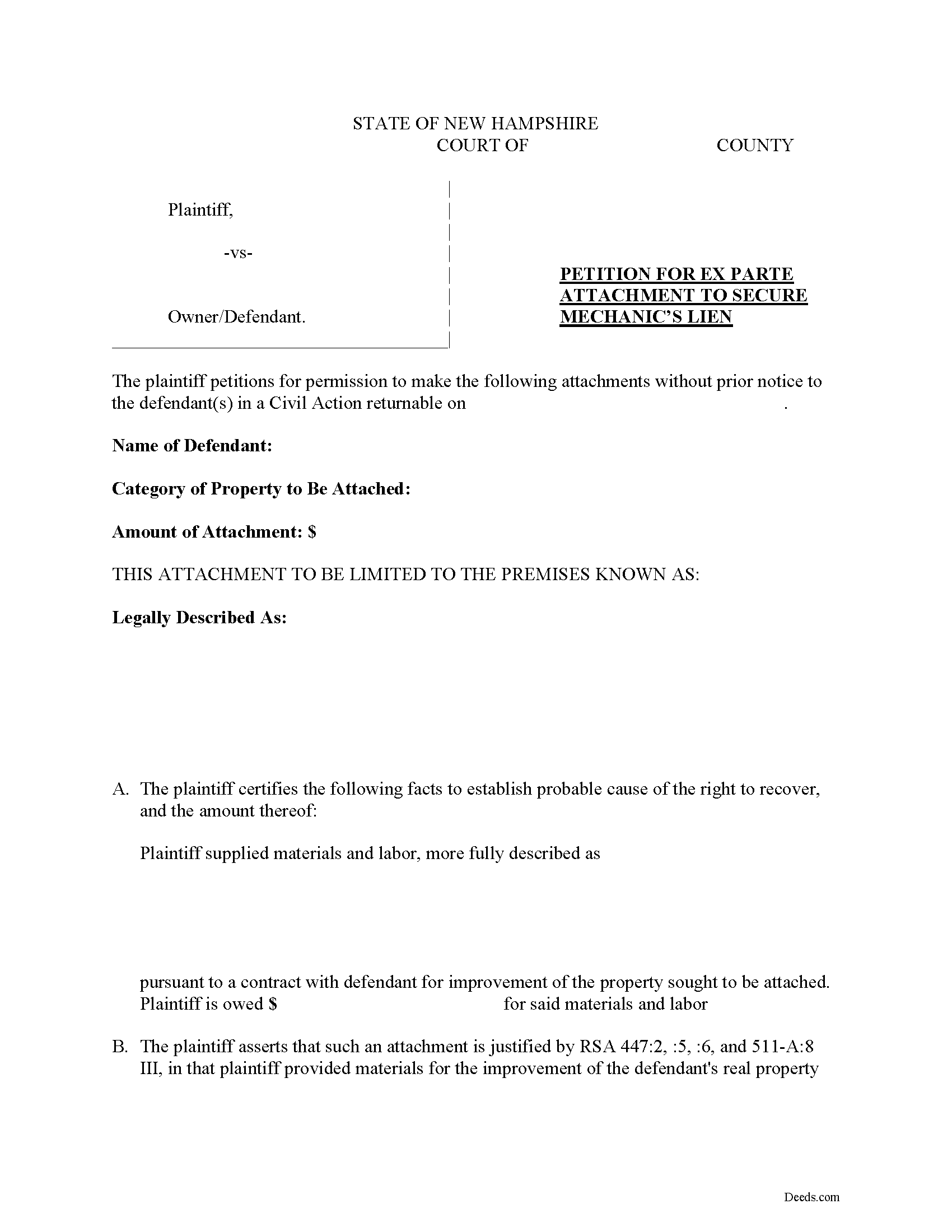
Filing a Mechanic's Lien in New Hampshire
Mechanic's liens are governed by Chapter 447 of the New Hampshire Statutes.
Mechanic's liens are used to help persuade an owner or other party to pay an outstanding bill for a work of improvement on real property. Because liens prevent an owner from selling or refinancing a property (or make it difficult to do so), liens are an effective remedy for contractors and other parties to earn their payment.
In New Hampshire, mechanic's liens must be secured through judicial attachment. This means a petition must be filed in court in the county where the property is located. As such, it's usually best to enlist the services of an attorney familiar with the practice of mechanic's lien law. Any such lien may be secured by attachment of the property upon which it exists at any time while the lien continues. NH RSA 447:10.
Such attachment take precedence over all lien claims for labor, professional design services, materials, or other things done or furnished after the attachment was made, unless that work was done or furnished in the performance of a contract existing when the attachment was made, or was necessary for the preservation of... More Information about the New Hampshire Petition for Ex Parte Attachment
Assignment of Lien
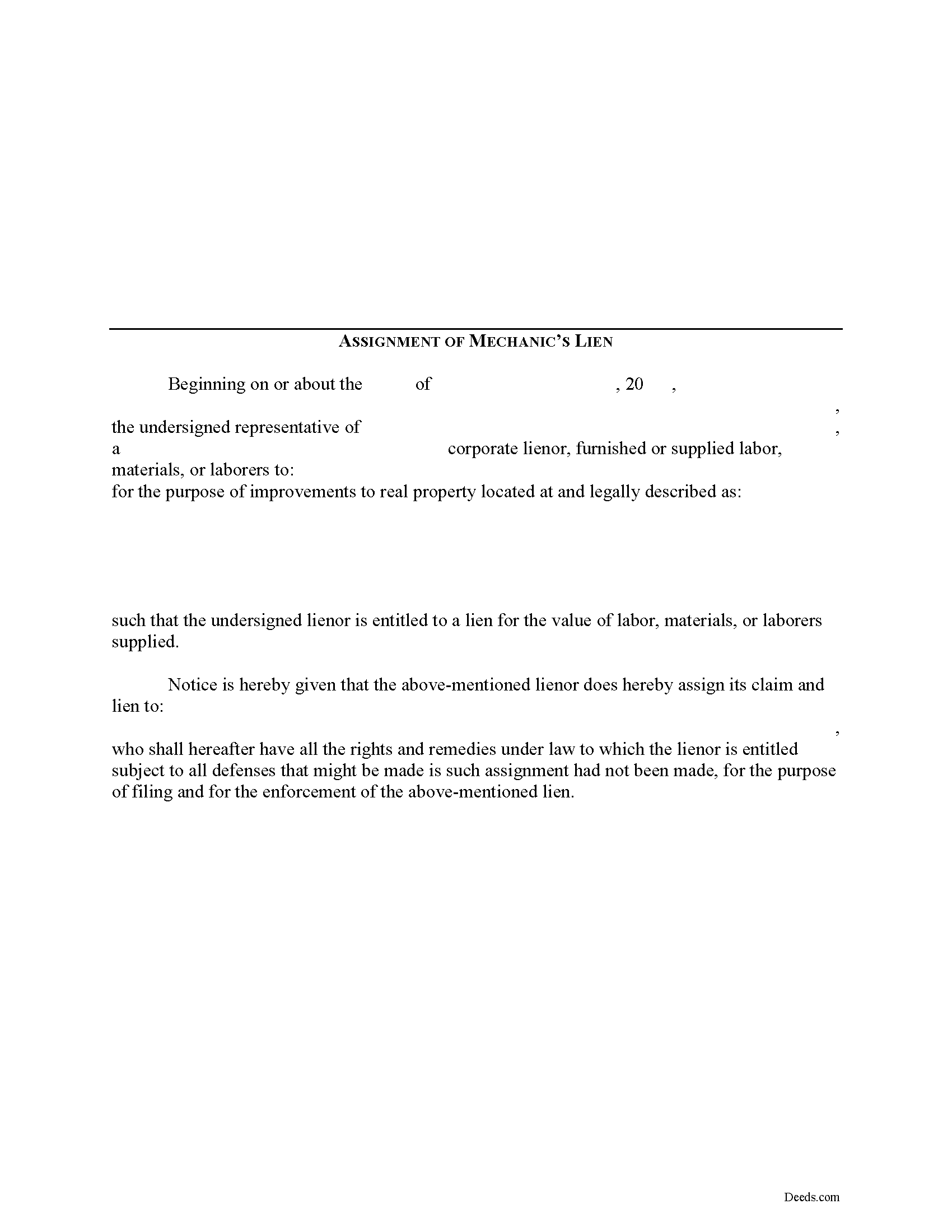
IMPORTANT: These forms are for assigning a mechanic's lien, NOT a general lien.
Construction liens are governed by Chapter 447 of the New Hampshire Statutes.
One of the fundamental principles of contract law is the right to assign contract rights to a third party. This is opposite to the principle of "delegation," which involves assigning the duties under a contract to a third party. For example, Jack contracts with Jill to build Jill a house. Jack then assigns the right to payment for the house to Fred (maybe he owes Fred some money on a debt). This is called an "assignment." Contrast that with if Jack were to enlist Fred to build the house for Jill to fulfill Jack and Jill's contract, this would be a "delegation" (although possibly not a legal one if Jill entered the agreement specifically to seek Jack's special services). With the basic legal terminology clarified, let's move on to how lien assignments work in New Hampshire.
Typically, under the rule on assignments, all rights of either seller or buyer can be assigned except where the assignment would materially change the duty of the other party, or increase materially the burden or risk imposed on the other party by t... More Information about the New Hampshire Assignment of Lien
Release of Mechanic Lien
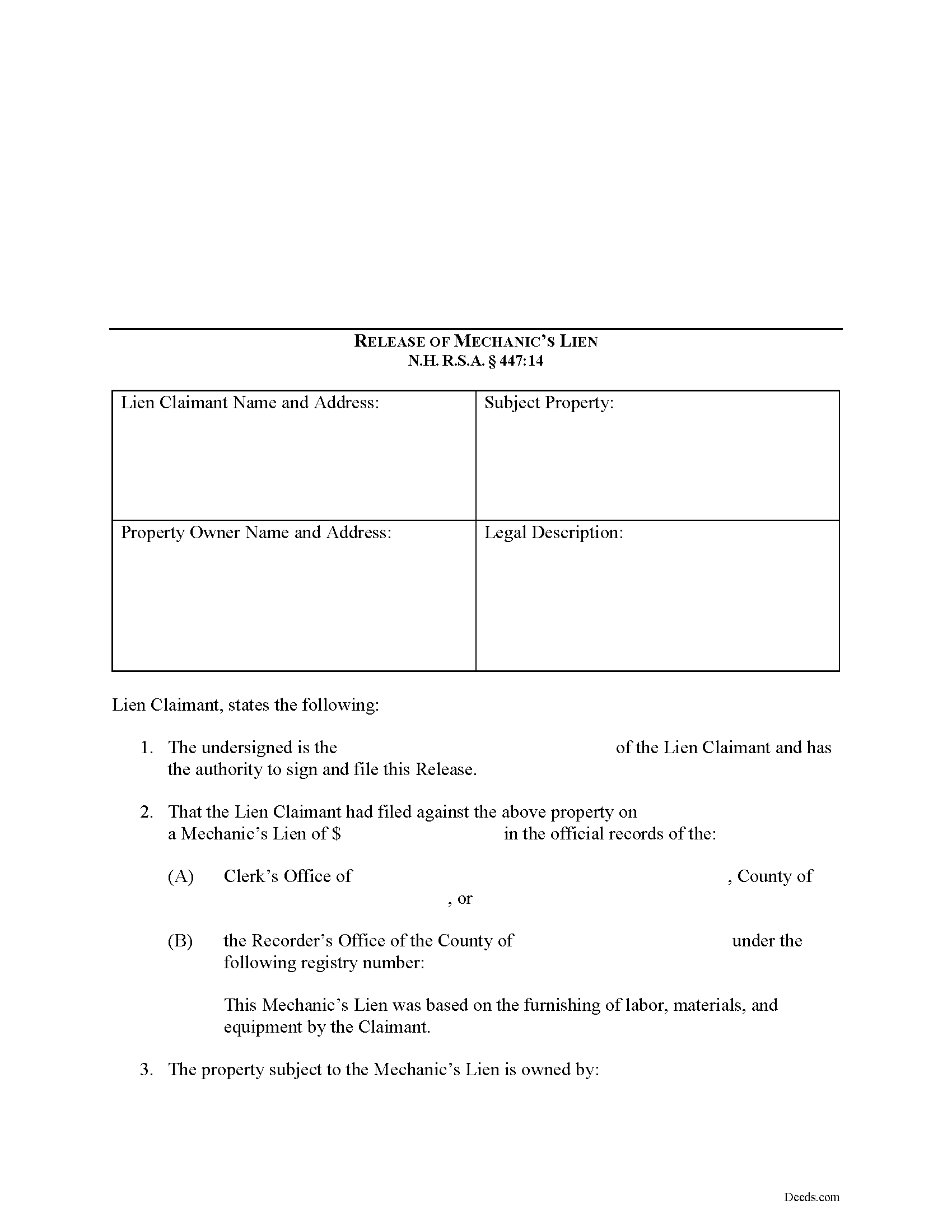
Releasing a Mechanic's Lien in New Hampshire
Mechanic's liens are governed by Chapter 447 of the New Hampshire Statutes.
Use a lien release form when a filed mechanic's lien is no longer needed because the underlying obligation has been paid off, the claim has been settled between the parties, or for any other valid reason.
The lien created by RSA 447:2-7, inclusive, shall continue for 120 days after the services are performed, or the materials, supplies or other things are furnished, unless payment is previously made, and shall take precedence of all prior claims except liens on account of taxes. NH RSA 447:9. Therefore, the release can be used to officially cancel a lien after the expiration of time. Any compelled release will not be recognized unless it was made in consideration of payment on the underlying claim.
In addition to meeting all local standards for recorded documents, the lien release identifies the parties, the location of the work, recording information for the filed lien, and relevant dates and amounts. Once completed and notarized, the claimant submits the release form to the same office where the lien is on file.
This article is offered for infor... More Information about the New Hampshire Release of Mechanic Lien
Partial Lien Waiver
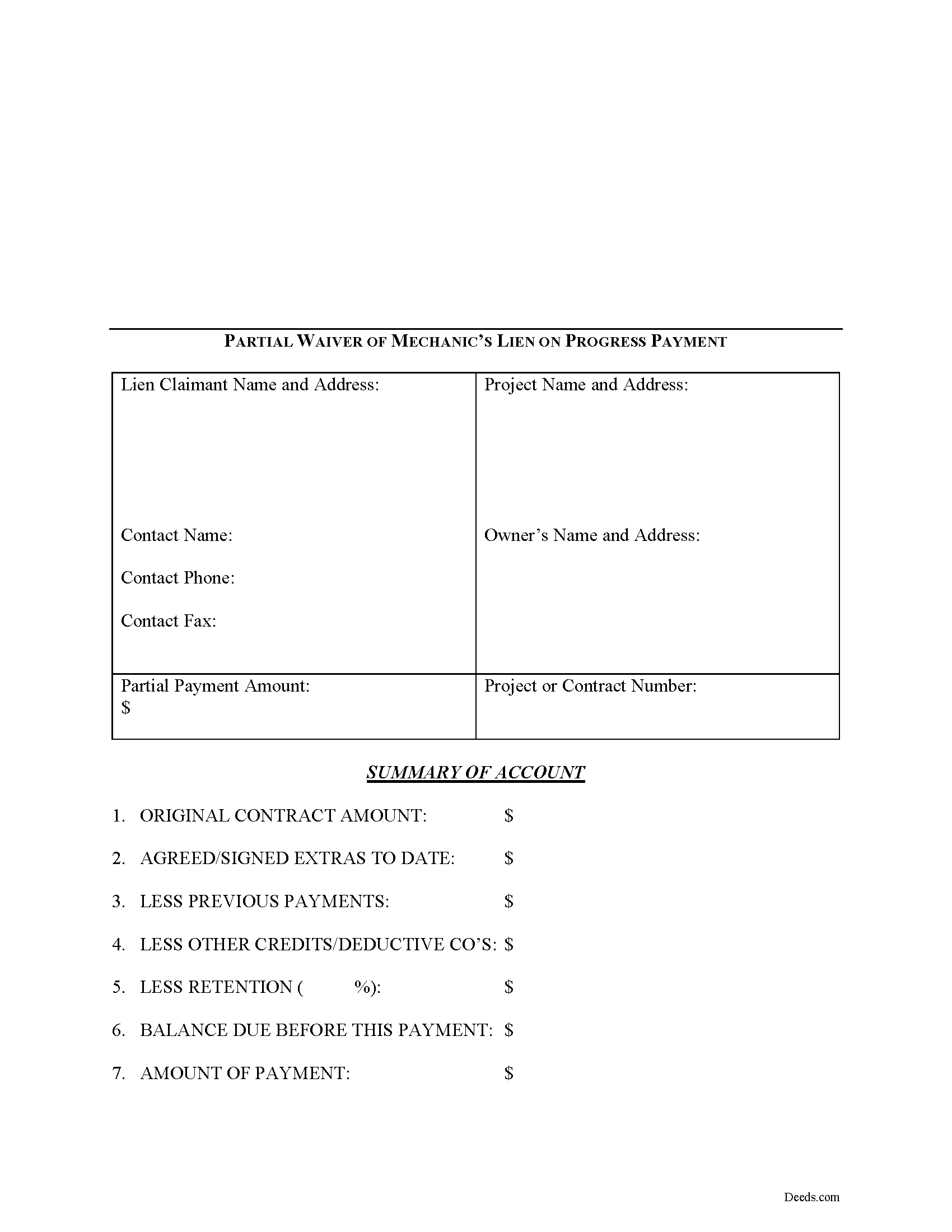
Mechanic's liens are governed under Chapter 447 of New Hampshire Statutes.
A waiver is a knowing relinquishment of a right. In this case, the person granting the waiver is relinquishing the right to seek a mechanic's lien for part of the amount due. This assurance is usually enough to induce the other party to pay toward the outstanding balance.
Use the Partial Lien Waiver when a partial or progress payment has been made and the potential lien claimant has no valid reason to maintain a right to a lien for the partial amount. The document identifies the parties, the location of the work or improvement, relevant dates, amounts due and paid, and any limitations or restrictions. Give the completed form to the owner in exchange for the partial payment.
This article is provided for informational purposes only and is not legal advice. Please contact an attorney with questions about lien waivers or any other issues relation to New Hampshire mechanic's lien laws.... More Information about the New Hampshire Partial Lien Waiver
Final Lien Waiver
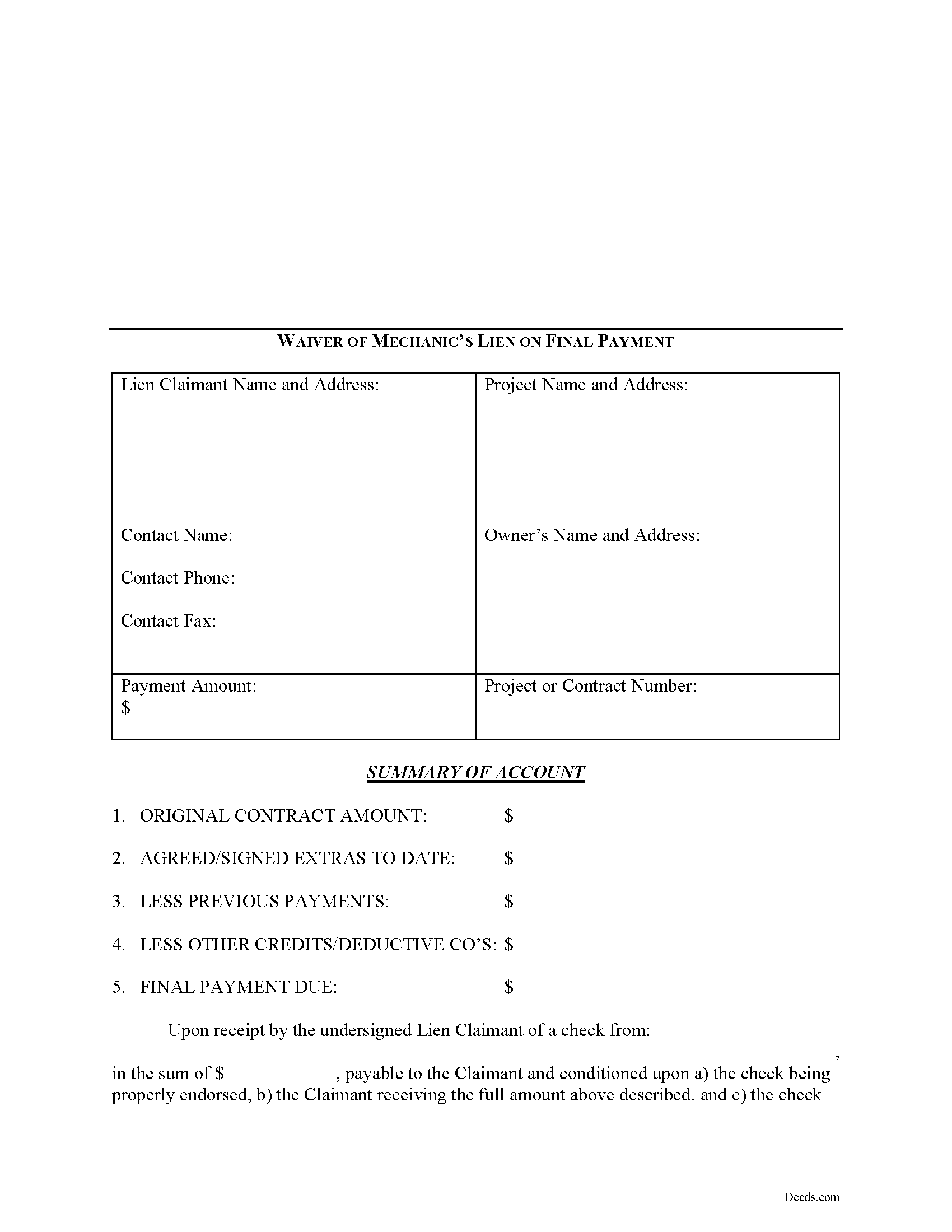
Mechanic's liens are governed under Chapter 447 of New Hampshire Statutes.
A waiver is a knowing relinquishment of a right. In this case, the person granting the waiver is relinquishing the right to seek a mechanic's lien for all or part of the amount due for work completed, or to be completed. This assurance is usually enough to induce the other party to pay.
Use the Final Lien Waiver when a final payment has been made (and cleared by the bank) and the potential lien claimant has no valid reason to maintain a right to a lien. A valid waiver identifies the parties, the location where the work or improvement took place, and relevant dates and payment amounts. It also sets forth any restrictions or limitations on the waiver of lien rights. Deliver the completed form to the property owner.
This article is provided for informational purposes only and is not legal advice. Please contact an attorney with questions about lien waivers or any other issues related to New Hampshire mechanic's lien laws.... More Information about the New Hampshire Final Lien Waiver
Notice to Construction Lender
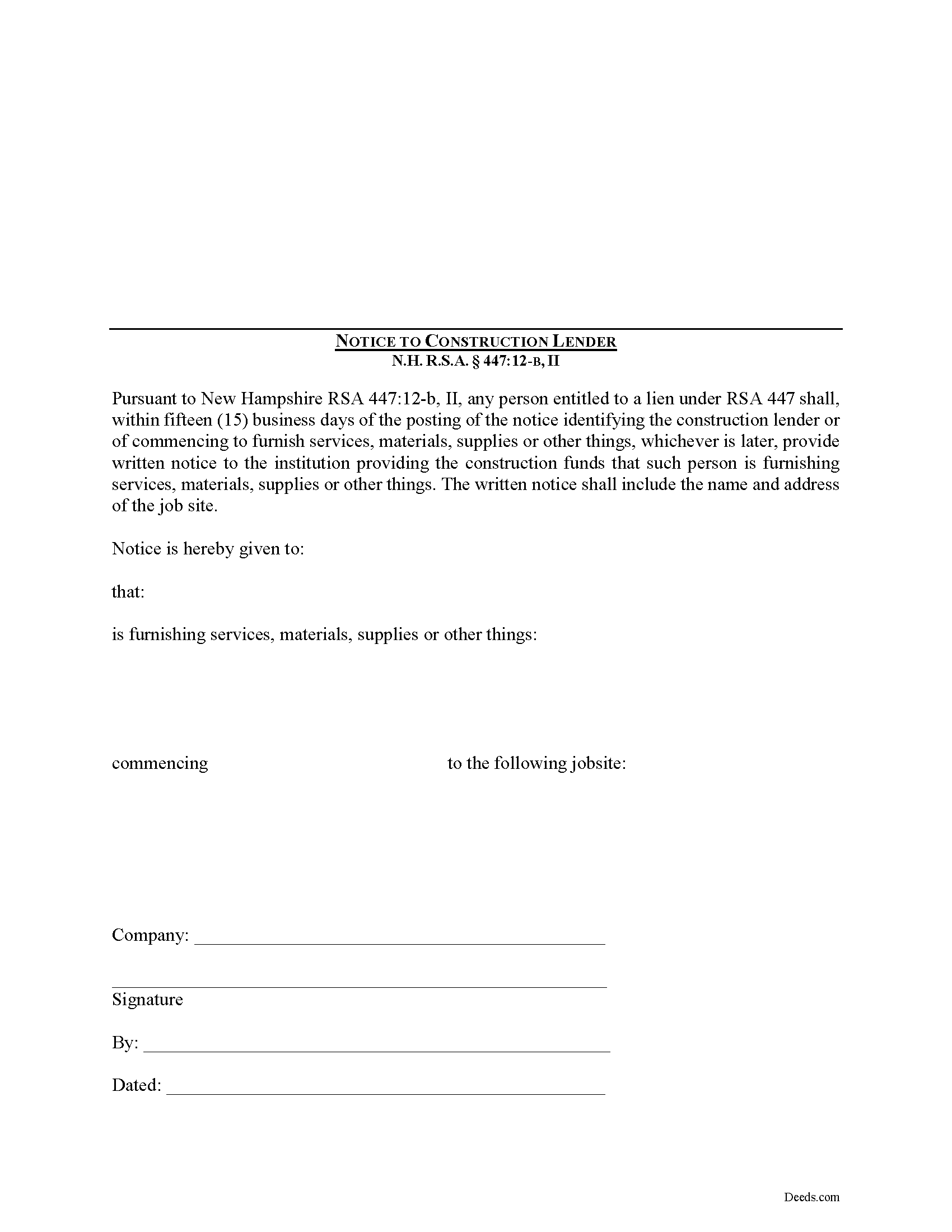
Proving Notice to Construction Lender in New Hampshire
Construction liens are governed by Chapter 447 of the New Hampshire Statutes.
Pursuant to New Hampshire RSA 447:12-b, II, any person entitled to a lien under RSA 447 shall, within fifteen (15) business days of the posting of the notice identifying the construction lender or of commencing to furnish services, materials, supplies or other things, whichever is later, provide written notice, via USPS Certified Mail with return receipt, to the institution providing the construction funds.
The notice states that such person is furnishing services, materials, supplies or other things necessary for the project. It identifies the parties, lists relevant dates, and includes the name and address of the job site. Failure to provide the notice required by this paragraph shall not alone invalidate the lien created by RSA 447:2-7. Id.
This article is offered for informational purposes only and is not legal advice. This information should not be relied upon as a substitute for speaking with an attorney. Please speak with an attorney familiar with lien laws for questions regarding required notifications to a construction lender or ... More Information about the New Hampshire Notice to Construction Lender
Owners Affidavit
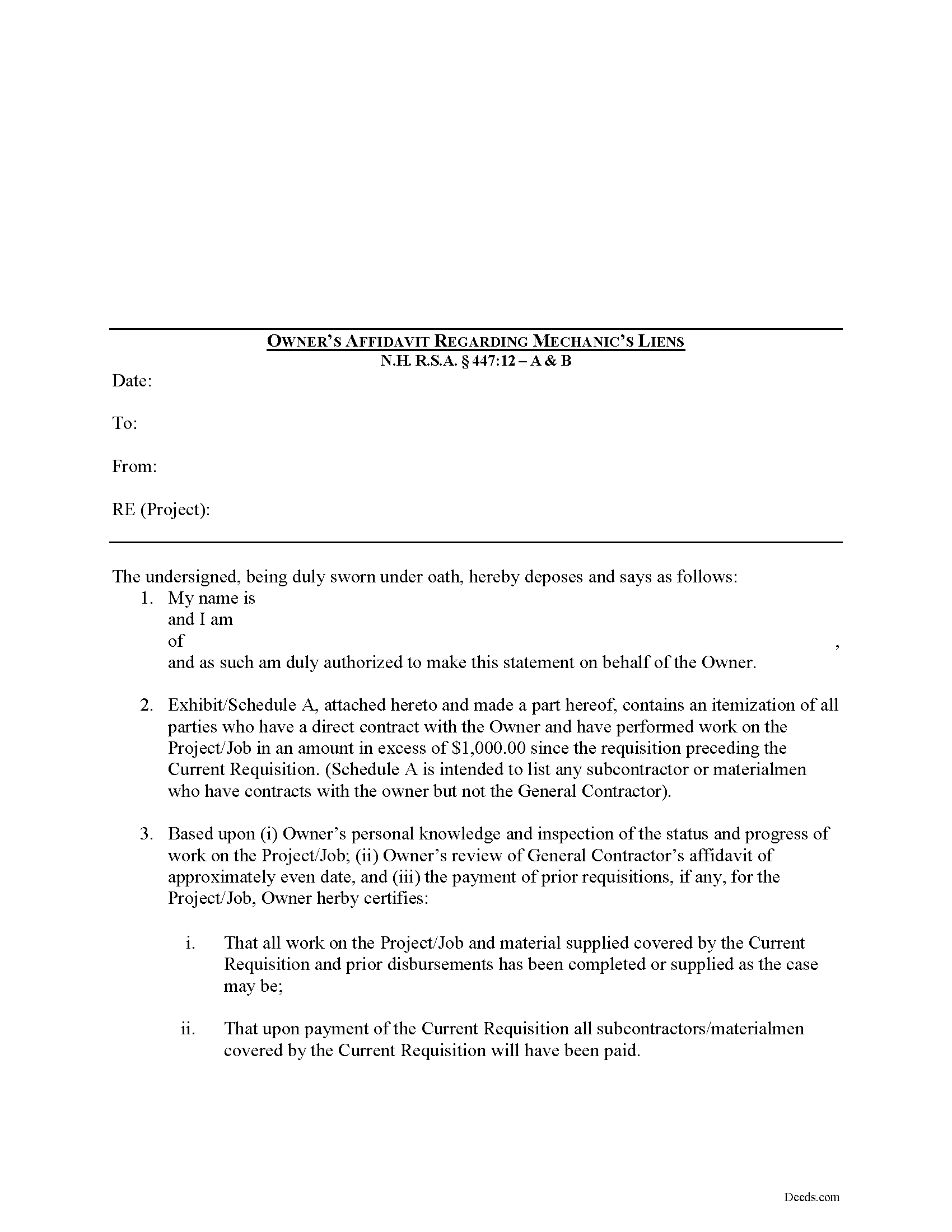
Owners Affidavit Regarding Liens in New Hampshire
Construction liens are governed by Chapter 447 of the New Hampshire Statutes.
In New Hampshire, property owners can use an affidavit containing details of all parties that have contracted with the owner to perform work on a project or job on the owner's property in excess of $1,000.00. The purpose of the document is to provide notice of all parties that have contracted with the owner but who may not have contracted with the general contractor.
The property owner should have personal knowledge and personally inspect the status and progress of work on the project. The owner should also review the general contractor's affidavit, if any, and the payment of any prior requisitions before making this certification. Be aware that affidavits are sworn statements, made under oath, and thus any false statement is subject to penalties for perjury.
The affidavit certifies: 1) that all work on the project or job and material supplied covered by the current requisition and prior disbursements has been completed or supplied as the case may be; and 2) that upon payment of the current requisition all subcontractors/materialmen covered by ... More Information about the New Hampshire Owners Affidavit
Contractor Affidavit
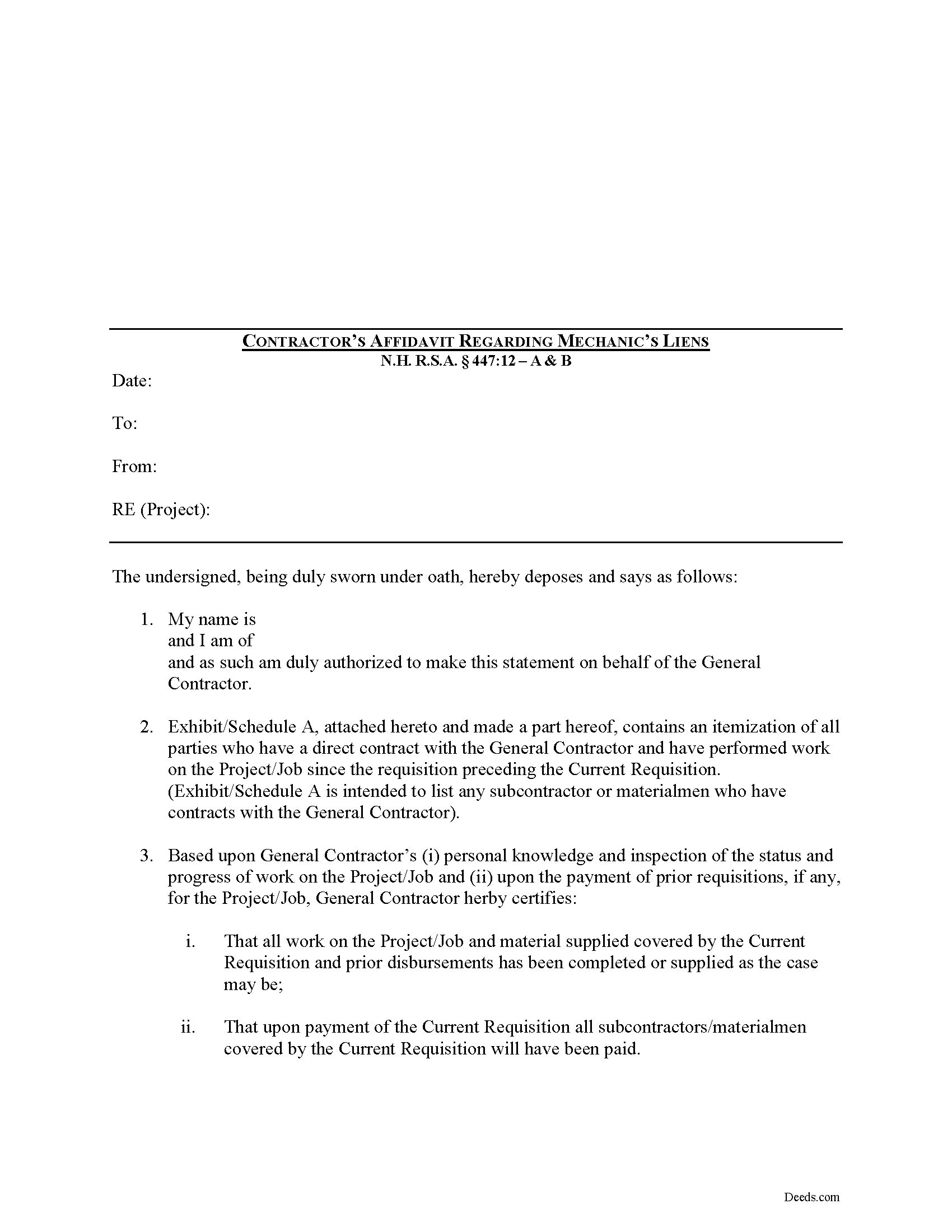
Contractor's Affidavit Regarding Liens in New Hampshire
Construction liens (also known as mechanic's liens) are governed by Chapter 447 of the New Hampshire Statutes.
In New Hampshire, contractors can use an affidavit, or sworn statement, containing details of all parties, such as subcontractors or materials suppliers, who have contracts with the general contractor to perform work on the project or job. The contractor delivers the completed affidavit to the property owner. The owner may then forward the affidavit to the lender who provided funding for the project, to verify that the funds are being used as agreed upon.
The affidavit must be based upon general contractor's personal knowledge and inspection of the status and progress of work on the project or job. It certifies that upon the payment of prior requisitions, if any, for the job, that: 1) all work on the project or job and material supplied covered by the current requisition and prior disbursements has been completed or supplied as the case may be; and 2) upon payment of the current requisition all subcontractors/materialmen covered by the current requisition will have been paid. N.H. R.S.A. 447:12-a.
The aff... More Information about the New Hampshire Contractor Affidavit
Subcontractor Affidavit
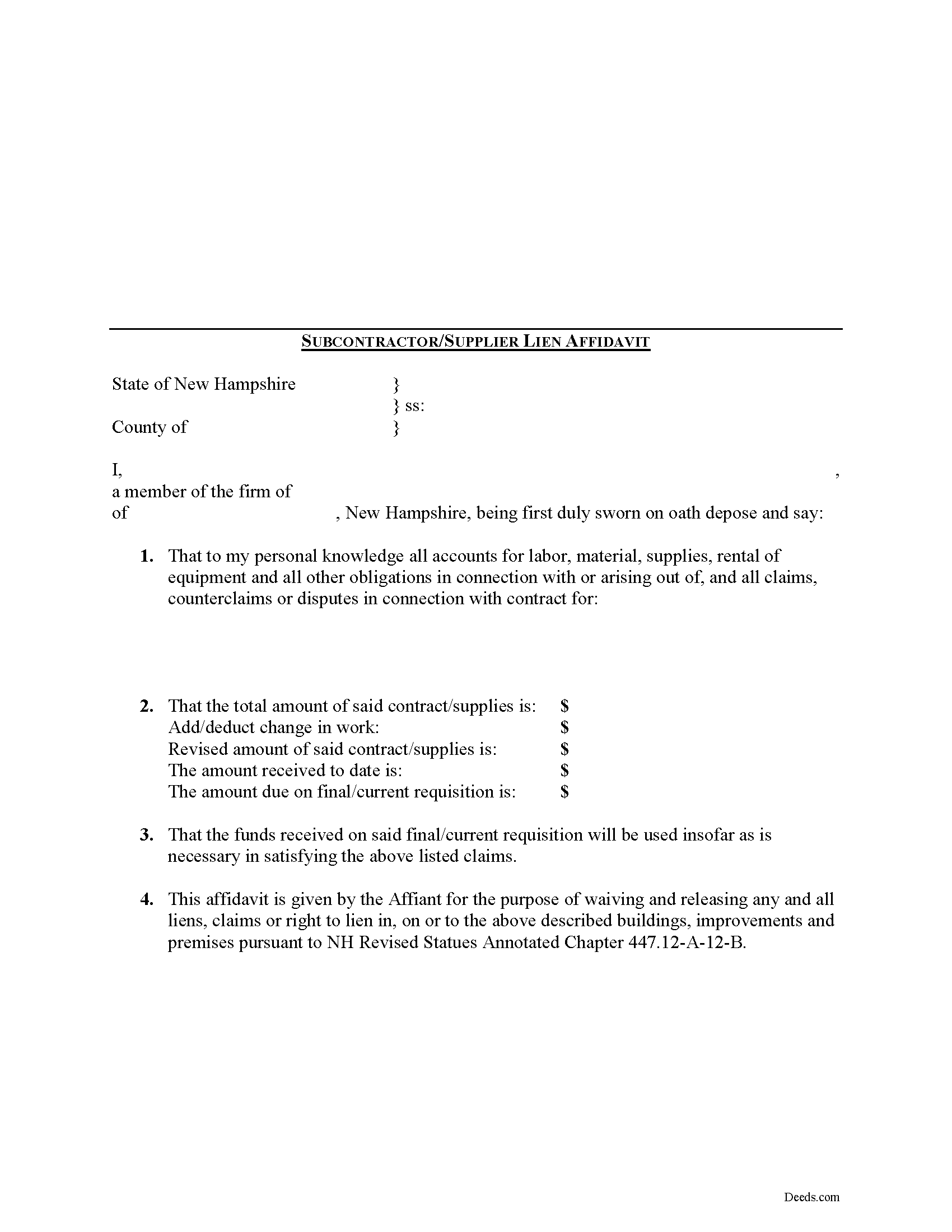
New Hampshire Subcontractor or Supplier Lien Affidavit
Construction liens are governed by Chapter 447 of the New Hampshire Statutes.
Loans or mortgages are available to cover costs of labor or materials and to avoid any liens being placed on real property undergoing improvement. In New Hampshire, lien waivers or lien releases made by a subcontractor or supplier should have an accompanying affidavit (sworn statement) that certifies the loan proceeds are being used to pay off any claims. The affidavit confirms that the final payment through a construction mortgage will be used to pay any claims arising out of the furnishing of labor or materials. N.H. R.S.A. 447-12-A.
The affidavit incudes: 1) the name of the subcontractor or supplier, 2) company name, 3), state of incorporation, 4) a description of labor, materials, and/or equipment furnished, and 5) a statement of all costs and payments associated with the job including any added or deducted estimates. Include the completed affidavit when submitting a waiver or release of lien rights to the local recording office.
This article is offered for informational purposes only and is not legal advice. This information should n... More Information about the New Hampshire Subcontractor Affidavit
Subcontractor Notice
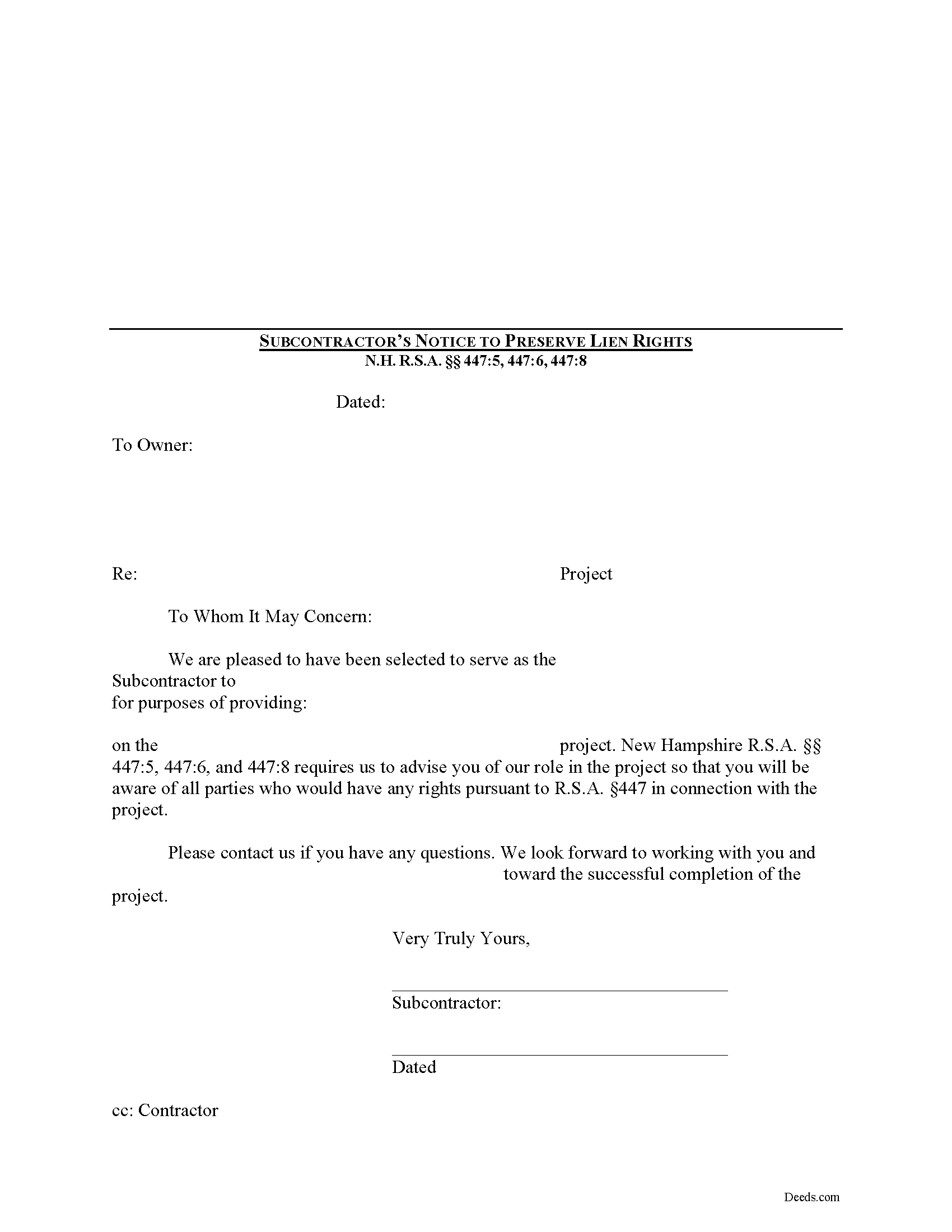
Subcontractor's Notice to Preserve Lien Rights in New Hampshire
Mechanic's liens are governed under Chapter 447 of the New Hampshire Statutes.
In order to claim a mechanic's lien in New Hampshire (and most other states) for labor or materials, contractors, subcontractors, and suppliers must provide preliminary, or pre-lien notices to preserve their right to claim a lien.
If a person performs labor, provides professional design services, or furnishes materials valued at $15.00 or more, by virtue of a contract with an agent, contractor or subcontractor of the owner, the person shall have a right to a lien, provided that he or she gives notice in writing to the owner or an authorized representative before performing the labor or furnishing the material for which it is claimed. NH RSA 447:5. This notice identifies the parties, the location and nature of the work, and the project.
Such notice may also be given after the work is provided. The lien shall be valid to the extent of the amount then due or that may become due to the contractor, agent or subcontractor of the owner. NH RSA 447:6. The account required under RSA 447:8 may also be given when the notice is delivered. I... More Information about the New Hampshire Subcontractor Notice
Subcontractor Monthly Notice
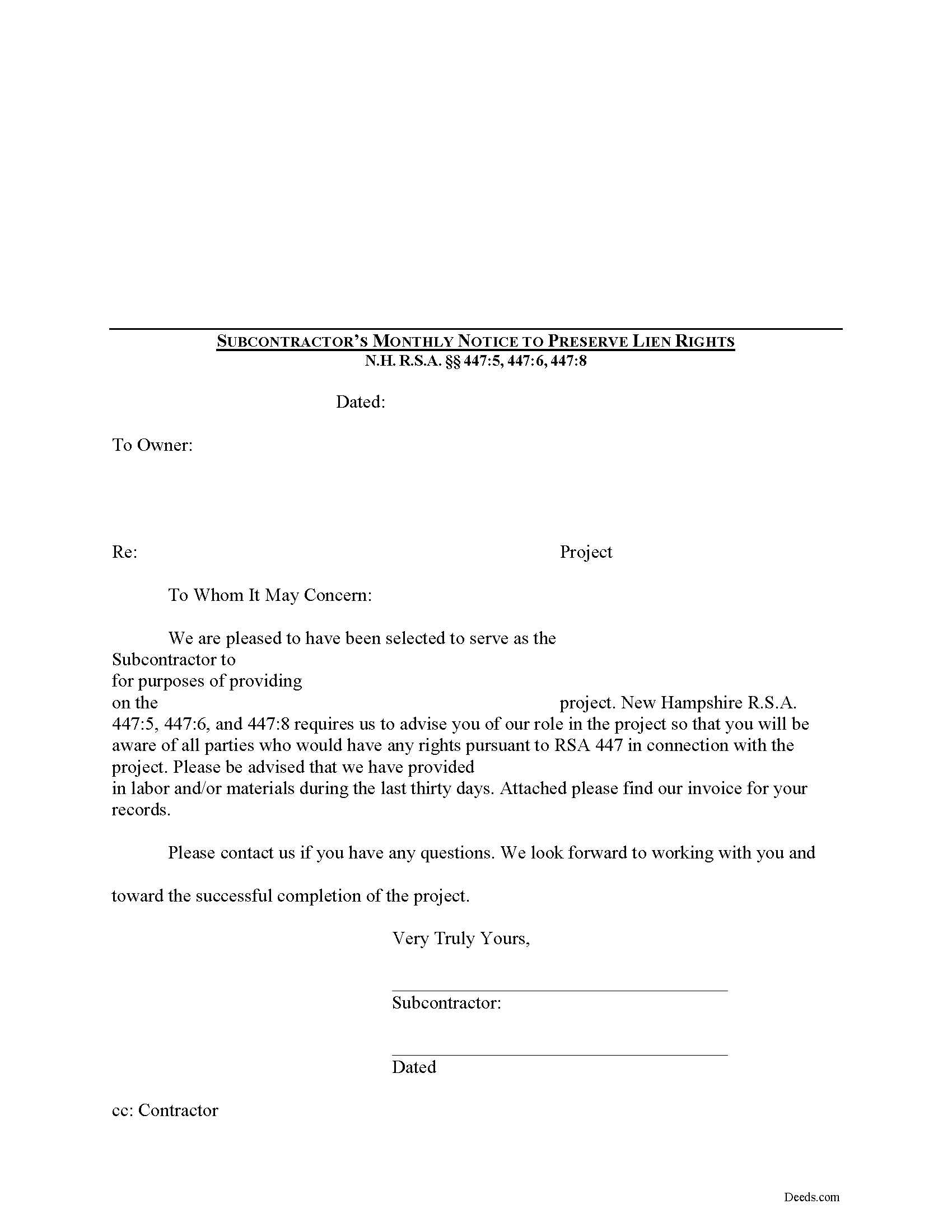
Subcontractor's Monthly Notice to Preserve Lien Rights in New Hampshire
Mechanic's liens are governed by Chapter 447 of the New Hampshire Statutes.
In order to claim a mechanic's lien in New Hampshire (and most other states) for labor or materials, contractors, subcontractors, and suppliers must provide preliminary, or pre-lien notices to protect their right to claim a lien.
If a potential claimant (person authorized under this Chapter to claim a lien) performs labor, provides professional design services, or furnishes materials valued at $15.00 or more, by virtue of a contract with an agent, contractor or subcontractor of the owner, the person shall have a right to a lien, provided, that he or she gives notice in writing to the owner or an authorized representative that he or she shall claim a lien before performing the labor or furnishing the material for which it is claimed. NH RSA 447:5.
The subcontractor may also give notice after the labor is performed, the professional design services are provided, or the material is furnished, and the lien shall be valid to the extent of the amount then due or that may thereafter become due to the contractor, agent or subcontr... More Information about the New Hampshire Subcontractor Monthly Notice
Trustee Certificate
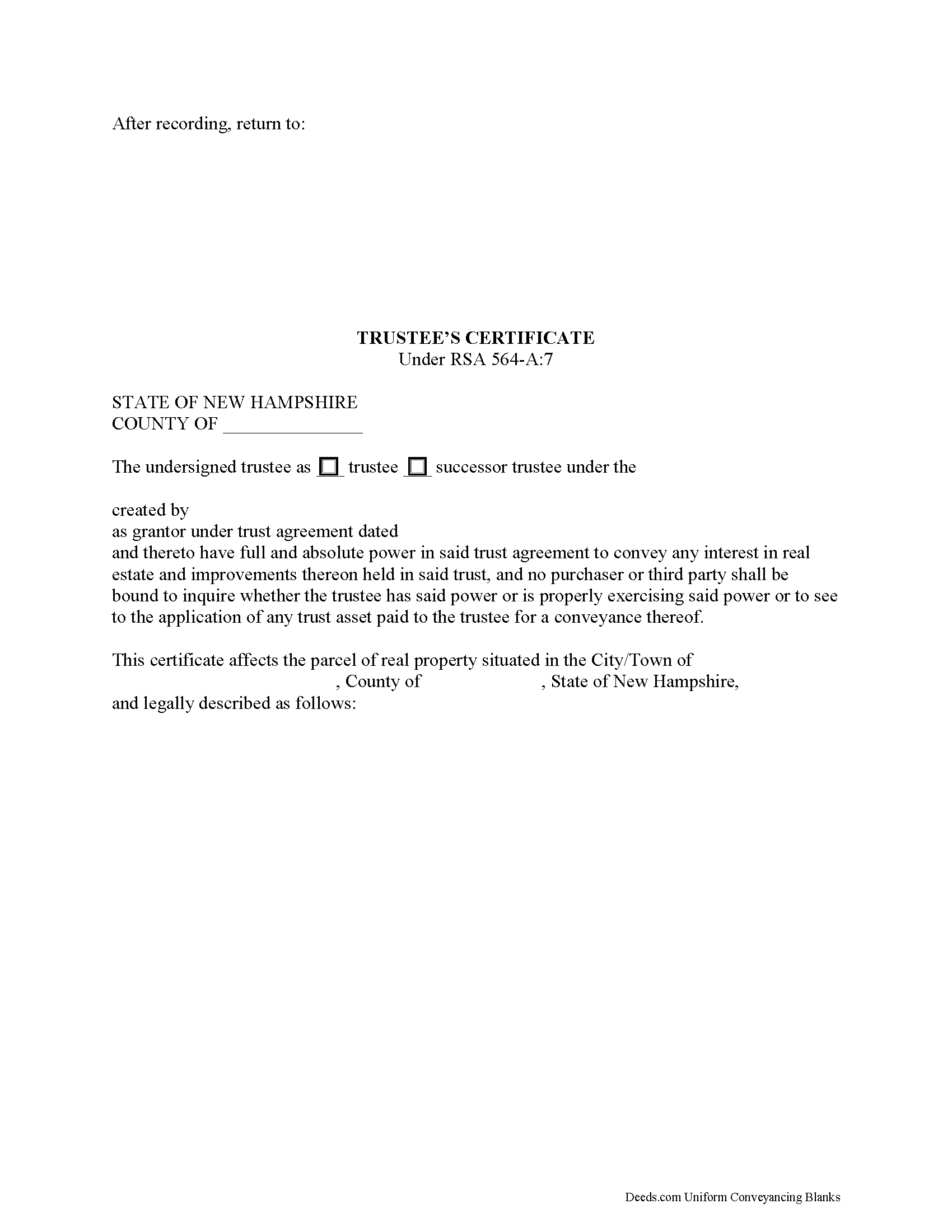
New Hampshire Trustee's Certificate for Real Property Transactions
In a trust arrangement, a grantor (settlor) conveys property to another person, called the trustee, for the benefit of another, called the beneficiary. As the trust is not a physical entity, it cannot hold title to property, and so a trustee acts as the trust's representative. The trustee administers the trust's assets pursuant to the terms set forth in the trust instrument. When property is conveyed out of the trust by the trustee, the transaction may need validation.
Codified at RSA 564-A:7, the trustee's certificate is a statutory form that protects third parties dealing with a trustee in transactions affecting real property. When recorded by a trustee in the registry of deeds in the county where the subject real estate is located, the certificate gives notice to all persons "that the trustee named therein and the trustee's successors have full and absolute power to convey any interest in real estate and improvements thereon held by the trustee," without further inquiry (564-A:7(II)). A certificate executed by a successor trustee has the same effect as the original certificate (564-A:7(III)).
The trustee... More Information about the New Hampshire Trustee Certificate
Disclaimer of Interest
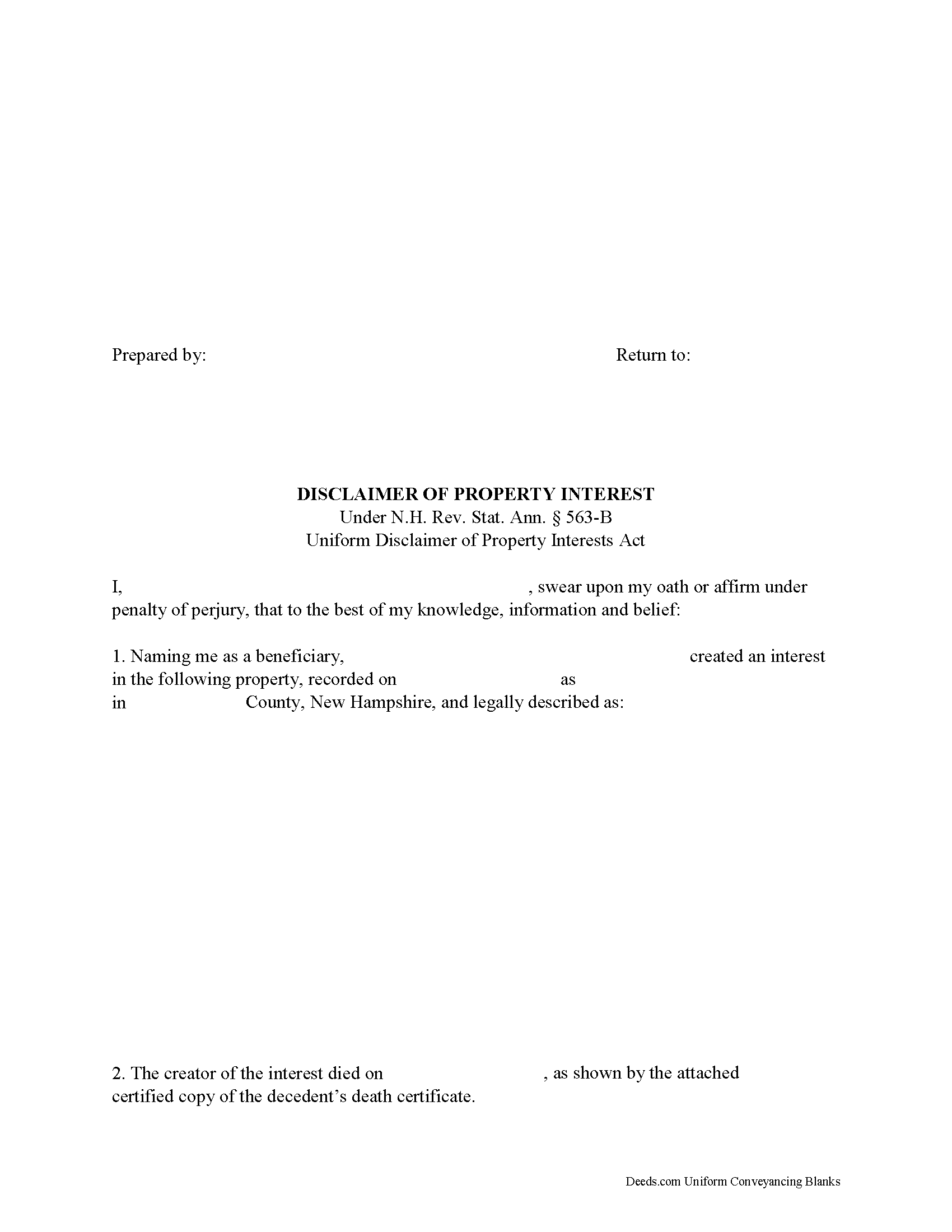
New Hampshire Disclaimer of Property Interests
Under the New Hampshire Statutes, the beneficiary of an interest in property may disclaim the gift, either in part or in full (RSA 563-B: Uniform Disclaimer of Property Interests Act). Note that the option to disclaim is only available to beneficiaries who have not acted in any way to indicate acceptance or ownership of the interest ( 563-B: 5).
The disclaimer must be in writing and include a description of the interest, a declaration of intent to disclaim all or a defined portion of the interest, and be signed by the disclaiming party (563-B: 3).
Deliver the disclaimer within nine months of the transfer (e.g., the death of the creator of the interest) to the personal representative or other fiduciary of the decedent's estate, to the trustee, the holder of legal title, or the person entitled to the property in case of a disclaimer. In addition, file a copy with the probate court of the county that has jurisdiction over proceedings regarding the estate of the deceased donor. If real property is involved, record a copy of the disclaimer in the registry of deeds of the county in which the property is located in order to avoid... More Information about the New Hampshire Disclaimer of Interest